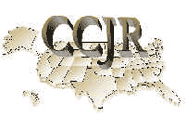February 15–16, 2024
Religion and Social Change
Religion has long been a force to push for changes in society on key issues, as well as sometimes a force to prevent changes in society. Religious groups and beliefs are also sometimes impacted by broader changes within society. This symposium will address topics such as: religion and key social issues today (like climate change, immigration, gun control, health, and race and gender inequalities); religion and key social issues in the past; religious groups' responses to or advocating for policy changes; religious responses to broader unfolding changes in society; and changing relationships between religion and institutions of society like science and medicine.
February 16–17, 2023
Religion in the Public Square
In 1963, in the case of Abington Township v. Schempp, the U.S. Supreme Court decided with an 8–1 decision that mandatory Bible reading and prayer were unconstitutional, that they violated the Establishment Clause of the First Amendment. On February 16–17, 2023, in reflection on the sixtieth anniversary of the court’s decision, the Kripke Center will host a symposium on Religion in the Public Square.
The schedule of the symposium, including the titles of the presentations, will be found here at a later date.
The symposium will take place Thursday and Friday, February 16–17, in Skutt Student Center 105, from 8:30 a.m. to 5:00 p.m.
The schedule of the symposium, including the titles of the presentations, can be found here.
April 8, 2022
The Anthropocene: Multidisciplinary Approaches
On May 21, 2019 the Anthropocene Working Group, an group formed by the Subcommission on Quarternary Stratigraphy and the International Commission on Stratigraphy, voted 29-4 that the “Anthropocene” should be treated as a formal chrono-stratigraphic unit beginning in the mid-twentieth century. Given this decision and the popularity of the “Anthropocene” in environmental discussions, eight Creighton faculty will gather to discuss what the Anthropocene means in their discipline.
The schedule of the symposium, including the titles of the presentations, can be found here.
The symposium will take place Friday, April 8, in Skutt Student Center 105, from 8:30 a.m. to 5:00 p.m.
February 17–18, 2022
Religion, Race, and the Other
The Kripke symposium will address the complex role that religion plays in racism and other forms of discrimination and dehumanization. Religion functions to unite and divide. It was used to support slavery as well as to call for its abolition. Religion establishes boundaries and thus may foster discrimination between peoples, but it also breaks down barriers and blurs distinctions.
The schedule of the symposium, including the titles of the presentations, can be found here.
The symposium will take place Thursday and Friday, February 17–18, in Skutt Student Center 105, from 8:30 a.m. to 5:00 p.m.
February 13-14, 2020
Religion and the New Politics
With the coming of the 2020 national election, the American public is addressing many new political configurations, such as Trumpism, the new Evangelicalism, socialism and democratic socialism, populism, and resistance movements, and many new (or newly framed) political issues, such as universal healthcare, the Green New Deal, immigration, nationalism, higher education reform, climate change, tax reform, LGBTQI rights, and many others. This Kripke Symposium seeks to address these issues and the role that religion can and does play in the new politics.
The schedule of the symposium, including the titles of the presentations, can be found here.
The symposium will take place Thursday–Friday, February 13-14, in Skutt Student Center 105, from 8:30 a.m. to 5:00 p.m.
December 8, 2019
Gospel Portraiture and the Art of Interpretation, presented by Dr. Susan Calef
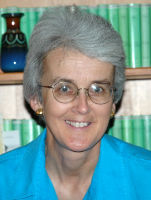 The talk will present an exploration of the distinctive features of each of the four Gospel “portraits” of Jesus and their contributions to Christian spirituality. The presentation will include select art works expressive of each portrait’s emphasis.
The talk will present an exploration of the distinctive features of each of the four Gospel “portraits” of Jesus and their contributions to Christian spirituality. The presentation will include select art works expressive of each portrait’s emphasis.
As a New Testament scholar and Director of the Women’s and Gender Studies Program at Creighton, Dr. Calef teaches courses on women and gender in biblical traditions, feminist and womanist interpretation of biblical texts, sickness and healing in the Bible, and the Gospels as sources of spirituality. She is currently writing a book on biblical spirituality entitled Questing God: Gospel Questions as Spiritual Guides.
The talk will be at the Abbott Lecture Hall at the Joslyn Art Museum at 2:00 p.m. It is free and open to the public.
November 10, 2019
How the Bible became Bible, presented by Dr. Nicolae Roddy
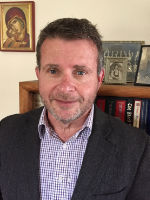 Most people agree the Bible did not fall from heaven in one fell swoop; but just what was the process by which selected oral and written traditions came to be shaped into a grand narrative of Israel’s past? Dr. Roddy’s presentation will offer a comprehensive look at textual signposts that help reveal how and why the Bible came to be.
Most people agree the Bible did not fall from heaven in one fell swoop; but just what was the process by which selected oral and written traditions came to be shaped into a grand narrative of Israel’s past? Dr. Roddy’s presentation will offer a comprehensive look at textual signposts that help reveal how and why the Bible came to be.
Nicolae Roddy is an Eastern Orthodox biblical scholar holding the rank of Professor of Theology at Creighton University and also serves as Visiting Professor of Biblical Archaeology at the Center for Jewish Studies at the University of Bucharest, Romania. For twenty years, Dr. Roddy served as co-director and area supervisor for the Bethsaida Archaeology Project, located near the Sea of Galilee.
The talk will be at the Abbott Lecture Hall at the Joslyn Art Museum at 2:00 p.m. It is free and open to the public.
October 27, 2019
Where Science Meets Scripture: The St. John’s Bible, presented by Drs. Gintaras Duda and Sherri Brown
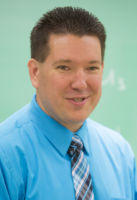 The St. John’s Bible, a bible for the 21st century, incorporates many scientific ideas and images into illuminations in the text. Where some might argue that religion and science are incompatible, the St. John’s Bible rejects this notion and serves as a beautiful example of the fundamental compatibility of faith and reason. In this presentation a physicist and a biblical scholar will come together to present a selection of these illuminations to show that when science and scripture do meet in dialogue a deeper understanding of the fundamental questions of existence can emerge. The audience will be equipped with tools to see the St. John’s Bible exhibition in a new light.
The St. John’s Bible, a bible for the 21st century, incorporates many scientific ideas and images into illuminations in the text. Where some might argue that religion and science are incompatible, the St. John’s Bible rejects this notion and serves as a beautiful example of the fundamental compatibility of faith and reason. In this presentation a physicist and a biblical scholar will come together to present a selection of these illuminations to show that when science and scripture do meet in dialogue a deeper understanding of the fundamental questions of existence can emerge. The audience will be equipped with tools to see the St. John’s Bible exhibition in a new light.
Gintaras Duda is a professor and chair of the department of physics at Creighton University. Trained as a particle theorist, his primary disciplinary research interest is the problem of dark matter: composition, detection, and fundamental theories/origins. In addition to astro-particle physics/cosmology, he is also involved heavily in physics education research and is deeply interested in questions of science and religion. Gintaras has received numerous teaching awards, including a Creighton College of Arts and Sciences award for excellence in teaching in 2010, and the Creighton University Distinguished Educator in Teaching as Scholarship in 2014. He was named the 2013 Carnegie Foundation for the Advancement of Teaching Outstanding Master’s Universities and Colleges National Professor of the Year.
 Sherri Brown is a biblical scholar who is an Associate Professor in the Department of Theology at Creighton University. Her research interests focus biblical narrative, and the Gospel and Letters of John in particular, but she also devotes attention to the Letters of Paul and the Catholic Epistles. She has authored, co-authored, or co-edited five books and numerous articles. Her textbook on the Johannine Literature, co-authored with Francis J. Moloney, won the 2018 Catholic Press Association first place award for reference books.
Sherri Brown is a biblical scholar who is an Associate Professor in the Department of Theology at Creighton University. Her research interests focus biblical narrative, and the Gospel and Letters of John in particular, but she also devotes attention to the Letters of Paul and the Catholic Epistles. She has authored, co-authored, or co-edited five books and numerous articles. Her textbook on the Johannine Literature, co-authored with Francis J. Moloney, won the 2018 Catholic Press Association first place award for reference books.
The talk will be at the Abbott Lecture Hall at the Joslyn Art Museum at 2:00 p.m. It is free and open to the public.
October 13, 2019
The Bible and Its Interpreters: Making Meaning out of Genesis 3, presented by Dr. Dulcinea Boesenberg
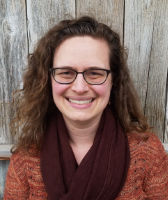 Most people are familiar with the story of Adam and Eve in the Garden of Eden, in which Satan tempts Eve to eat from the tree of the knowledge of good and evil, and humanity falls into sin. However, the text of Genesis 3 does not mention Satan, a fall, or sin! These elements are familiar because Genesis 3 is generally read in light of the interpretations of ancient Jews and Christians who answered the questions raised by the sparse narrative of Genesis 3 with the assumption that the text contained lessons for them.
Most people are familiar with the story of Adam and Eve in the Garden of Eden, in which Satan tempts Eve to eat from the tree of the knowledge of good and evil, and humanity falls into sin. However, the text of Genesis 3 does not mention Satan, a fall, or sin! These elements are familiar because Genesis 3 is generally read in light of the interpretations of ancient Jews and Christians who answered the questions raised by the sparse narrative of Genesis 3 with the assumption that the text contained lessons for them.
Recognizing this distinction between a text and its interpretations, how should modern readers make sense of biblical texts? Do they contain lessons for us, and, if so, are they the same lessons that ancient readers found?
Dulcinea Boesenberg is an Assistant Professor of Theology at Creighton University. She holds a PhD from Notre Dame is in the area of Christianity and Judaism in Antiquity, and her research focus on the New Testament and Second Temple Judaism.
The talk will be at the Abbott Lecture Hall at the Joslyn Art Museum at 2:00 p.m. It is free and open to the public.
October 1, 2019
Complicity and Resistance: The Female Face of Racial (In)Justice
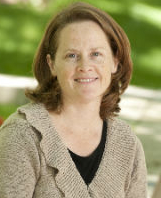 The Women and Religion lecture will be delivered by Dr. Jeannine Hill Fletcher.
The Women and Religion lecture will be delivered by Dr. Jeannine Hill Fletcher.
Dr. Fletcher is Professor of Theology at Fordham University. Trained as a feminist theologian at Harvard Divinity School, Prof. Hill Fletcher is interested in how religious identity is constructed and mobilized in a pluralistic world. Her current work focuses on how White Christian theology can be oriented toward anti-racist projects for the thriving of diversity in the U.S. context. Her most recent book, The Sin of White Supremacy: Christianity, Racism and Religious Diversity in America (2018) investigates the history of theological thinking informing legislation and envisions Christian symbolism as a resource for transformative politics and activist practice.
Prof. Hill Fletcher teaches at the intersection of Systematic Theology and issues of diversity (religious diversity, Christian cultural diversity, race and gender). Her research and teaching explore the role of theological thinking in shaping public discourse, including both activism and legislation. Prof. Hill Fletcher is a board member of the Northwest Bronx Community and Clergy Coalition, a multi-generational, multi-religious and multi-racial grassroots organization working for social change.
Prof. Hill Fletcher’s talk, co-sponsored by the Women and Gender program, will be in the Harper Center Ballroom at 5:00 p.m. It is free and open to the public.
March 29-30, 2019
Rocky Mountain – Great Plains AAR/SBL Regional Meeting
The Kripke Center and Creighton University are hosting the annual regional meeting of the American Academy of Religion and the Society of Biblical Literature. The conference will be held on the third floor of the Harper Center. Further information on the conference and the region can be found on the region’s website at http://wwww.rmgp.org
February 14-15, 2019
Religion and Justice
Within the last few years, notions of justice (and truth) have been problematized. From the veracity of political speech and “fake news” to claims that “social justice is no justice,” what is just and true has become highly contested in the public square. This is particularly problematic given the central role that justice plays in many religious traditions. In addition to addressing the problematization of justice in contemporary society, this symposium will explore the many facets of justice and its relationship to religion by addressing specific forms and examples of justice. Papers may address issues of truth and deception, poverty and social justice, food and environmental justice, economic justice, or other forms of justice with historical and/or contemporary examples related to diverse religious traditions.
The symposium will take place Thursday–Friday, February 14-15, in Skutt Student Center 105, from 8:30 a.m. to 5:00 p.m.
The schedule of the symposium, including the titles of the presentations, can be found here.
October 4, 2018
The Bible, Politics, and the Survival of Planet Earth
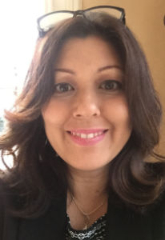 The Bible has played a role in some political debates over climate change, where it has been read to suggest that belief in human induced climate change is a rejection of God's omnipotence. This talk will examine the biblical texts that pertain to the climate and humans' relationship to the earth to show alternative interpretations on the issue, raising important questions about whether the Bible should be used to influence public policy in our democracy.
The Bible has played a role in some political debates over climate change, where it has been read to suggest that belief in human induced climate change is a rejection of God's omnipotence. This talk will examine the biblical texts that pertain to the climate and humans' relationship to the earth to show alternative interpretations on the issue, raising important questions about whether the Bible should be used to influence public policy in our democracy.
Frances Flannery is Professor of Religion at James Madison University. She earned her Ph.D. in Religion at The University of Iowa, concentrating on the origins of apocalypticism in early Judaism and early Christianity. Her research on apocalyptic thought and movements extends from antiquity to the present day, with a focus on the intersections of apocalyptic thinking with environmental issues and terrorism. Her books include Understanding Apocalyptic Terrorism: Countering the Radical Mindset (Routledge, 2015) and an edited volume with Rodney Werline, The Bible In Political Debate (Bloomsbury, 2016). She regularly shares her research with the intelligence community and is also an activist in community peacebuilding, interfaith dialogue, and public education about religions and the academic study of religion.
The talk by Prof. Flannery will take place on Thursday, October 4, in Harper Center 3028 at 4:00 p.m. It is free and open to the public.
Listen to Prof. Flannery’s lecture here.
April 9, 2018
Revisiting Tamar: Violence against Women and the Church’s Response in the #MeToo Era
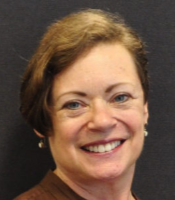 The biblical story of Tamar, the daughter of King David, with a few tweaks could be today's latest #MeToo headline - a vulnerable young woman is assaulted by a man in power and told to hush up the crime; as events unfold, the king laments the downfall of her perpetrator without acknowledging her trauma. What are the enduring dynamics of violence against women from the Bible to today, and what is the church's role in intervention and prevention in the #MeToo era?
The biblical story of Tamar, the daughter of King David, with a few tweaks could be today's latest #MeToo headline - a vulnerable young woman is assaulted by a man in power and told to hush up the crime; as events unfold, the king laments the downfall of her perpetrator without acknowledging her trauma. What are the enduring dynamics of violence against women from the Bible to today, and what is the church's role in intervention and prevention in the #MeToo era?
Pamela Cooper-White is the Christiane Brooks Johnson Professor of Psychology & Religion at Union Theological Seminary in New York. She has advanced degrees in historical musicology, religion, and clinical social work.
Dr. Cooper-White's research interests have centered on feminist/Womanist theology and the prevention of violence against women; countertransference, intersubjectivity, and the use of the self in pastoral care and psychotherapy; the intersection of pastoral theology and postmodern relational psychoanalysis; and the history of early psychoanalysis and religion. She is the author of 5 books, Braided Selves: Collected Essays on Multiplicity, God, and Persons; Many Voices: Pastoral Psychotherapy and Theology in Relational Perspective; Shared Wisdom: Use of the Self in Pastoral Care and Counseling; The Cry of Tamar: Violence Against Women and the Church's Response; Schoenberg and the God Idea: The Opera 'Moses und Aron' ; as well as Explorations in Practices of Ministry, co-authored with Michael Cooper-White.
Dr. Cooper-White is an accomplished professional soloist, an ordained Episcopal priest, a certified clinical Fellow in the American Association of Pastoral Counselors, a Licensed Clinical Professional Counselor in Illinois, and a Board Certified Counselor in the National Board for Certified Counselors.
Dr. Cooper-White's talk will be Monday, April 9, at 6:30 p.m. in Harper 3023. Her talk is co-sponsored by the Women and Gender Studies program; the talk is free and open to the public.
March 20, 2018
The Rwandan Genocide: Hopes and Challenges
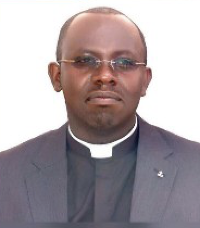 In 2019, Rwanda will commemorate 25 years after the 1994 Genocide. A generation after the genocide, Rwanda has experienced some levels of healing. Improvements in government, the economy, community, technology, and education have given many people reason to hope.
In 2019, Rwanda will commemorate 25 years after the 1994 Genocide. A generation after the genocide, Rwanda has experienced some levels of healing. Improvements in government, the economy, community, technology, and education have given many people reason to hope.
Marcel Uwineza, S.J., a Jesuit priest from Rwanda, will address the genocide in a public lecture. He is particularly interested in the relationship between the Church and human rights, religion, and international politics. Uwineza has published articles focusing on memory, justice and reconciliation, church, human rights, and human development in the context of post-genocide Rwanda.
Fr. Uwineza's talk will be given on Tuesday, March 20 at 5:30 p.m. in Skutt 105. The lecture is open to the public.
February 15-16, 2018
Religion and Reform
In commemoration of the 500th anniversary of the Reformation, the annual Kripke Symposium will address the mutability of religion
Although ostensibly of divine inspiration, religions are not immutable; they have changed in significant ways due to historical, economic, social, and political circumstances and causes. Some changes have been intentional, some have been compelled on the religion and necessary for survival, and others have not even been noticeable except from historical perspective. This symposium will address the many ways in which religion has changed, is changing, and perhaps needs to change, and their particular causes. Proposals addressing the topic from a broad range of disciplines and focusing on diverse religious traditions are encouraged.
The symposium will take place Thursday–Friday, February 15-16, in Harper Center 3023, from 8:30 a.m. to 5:00 p.m. The schedule for the symposium will be posted around the beginning of the new year.
The schedule of the symposium, including the titles of the presentations, can be found here.
November 14, 2017
Violence, White Supremacy, and #Charlottesville: Can We Learn Anything from the Ethics of War?
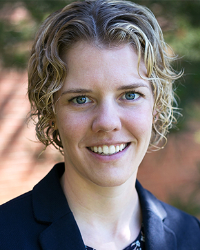 Many people were shocked and saddened by the violence that came out of the “Unite the Right” rally in Charlottesville, Virginia on August 11 and 12, 2017. Dr. Laura Alexander’s talk asks what sorts of violence or threats of violence were present, whether the violence was sanctioned (police presence) or unsanctioned (street brawling), and how we might sort out and understand the various uses of violence or threat of violence in a chaotic protest situation. The lecture draws on principled ethical thinking about the use of force in the context of war in order to examine how violence, if present in a protest situation, might be used to promote safety and well-being rather than to intimidate or unjustly harm. In addition to consideration of violence in general, it will engage concerns about the intersection of violence and speech when weapons, shields, and other means of using force are incorporated into protests.
Many people were shocked and saddened by the violence that came out of the “Unite the Right” rally in Charlottesville, Virginia on August 11 and 12, 2017. Dr. Laura Alexander’s talk asks what sorts of violence or threats of violence were present, whether the violence was sanctioned (police presence) or unsanctioned (street brawling), and how we might sort out and understand the various uses of violence or threat of violence in a chaotic protest situation. The lecture draws on principled ethical thinking about the use of force in the context of war in order to examine how violence, if present in a protest situation, might be used to promote safety and well-being rather than to intimidate or unjustly harm. In addition to consideration of violence in general, it will engage concerns about the intersection of violence and speech when weapons, shields, and other means of using force are incorporated into protests.
Laura Alexander is Assistant Professor of Religious Studies at UNO and holds the Goldstein Family Community Chair in Human Rights. She received her Ph.D. from the University of Virginia and left Charlottesville to come to Omaha less than a week before the August 11-12 protests. Dr. Alexander studies ethical thinking about religion and human rights, with a focus on issues of just war, peacemaking, and refugee issues.
Dr. Alexander's talk will take place on Tuesday, November 14 at 3:30 p.m. in Harper Center 3023.
October 5-6, 2017
Religion and Secularlism
This symposium will address the history, sources, and significance of secularism and its relationship to religions and religious traditions.
The symposium will take place Thursday–Friday, October 5-6, in Harper Center 3023, from 9:00 a.m. to 5:00 p.m. The symposium is co-sponsored by the John C. Kenefick Faculty Chair in the Humanities.
The schedule of the symposium, including the titles of the presentations, can be found here.
June 25, 2017
Luther and the Jews: Responsibility and Reconciliation
In commemoration of the 500th anniversary of the Protestant Reformation, we will explore Martin Luther's relationship to the Jews, its implications, and recent responses from Lutheran communities.
Set within the framework of dialogue and discussion, Professors Dean Bell and Peter Pettit will present their respective understandings of Luther's anti-Semitism within historical and contemportary context. Each professor will give a brief presentation, followed by dialogue and discussion with and among the audience.
Dean Bell is Provost, Vice President, and Professor of History at Spertus Institute for Jewish Learning and Leadership. He is a scholar of medieval and early modern Jewish history, especially in Germany.
Peter Pettit is Associate Professor of Religion Studies and Director of the Institute for Jewish-Christian Understanding at Muhlenberg Collge. He is a leader in Jewish-Christian dialogue, and a scholar of biblical studies, theology, and Israel studies.
The presentations and dialogue will take place on Sunday, June 25, from 2:00 to 4:00 p.m. at Beth El Synagogue (14506 California St. in Omaha). The event is free and open to the public.
April 4, 2017
Embodying Eucharist: Gender, Race, and Body
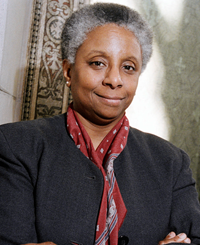 The Woman and Religion lecture will be delivered by M. Shawn Copeland, Professor of Theology, Boston College.
The Woman and Religion lecture will be delivered by M. Shawn Copeland, Professor of Theology, Boston College.
Professor Copeland's research interests converge around issues of theological and philosophical anthropology and political theology, as well as African and African–derived religious and cultural experience and African-American intellectual history.
She is the author of three books: Enfleshing Freedom: Body, Race, and Being (Fortress Press, 2010); The Subversive Power of Love: The Vision of Henriette Delille: The Madeleva Lecture in Spirituality (Paulist Press, 2009); and, with LaReine-Marie Mosely and Albert Raboteau, Uncommon Faithfulness: The Black Catholic Experience (Orbis Books, 2009). She has authored more than 80 articles, book chapters, and reviews.
Professor Copeland's lecture will be given on Tuesday, April 4, at 5:00 p.m. in the Harper Center Ballroom. This lecture is co-sponsored by the Women and Gender Studies Program. Listen to her lecture here.
February 16-17, 2017
Religion in Global Context
Central to global issues and globalization is the breaking down of boundaries (and barriers), whether they be religious, national, ethnic, ecological, economic, technological, or others. This symposium will address how religion affects and is affected by a wide range of global issues and globalization, historically and in the present. Global issues that may be considered include economic inequality and justice, the environment and the anthropocene, migration and immigration, refugees, interfaith dialogue and relations, identity and assimilation, among many other possibilities.
The schedule of the symposium, including the titles of the presentations, can be found here.
The symposium will take place from 8:30 – 5:00 on Thursday and Friday, February 16-17, in the Harper Center 3029. The symposium is open to the public.
February 13, 2017
Panel Discussion on Martin Scorsese's Film, Silence
Three scholars will analyze and discuss the religious themes of Silence. The panelists are:
- Fr. Peter Nguyen, S.J., Theology Department, Creighton University
- Lydia Cooper, English Department, Creighton University
- Fr. Mark Bosco, S.J., English and Theology Deparments, Loyola University of Chicago
The panel discussion will take place on Monday, February 13, 2017 at 6:00 p.m. in the Reinert Memorial Library L02. The panel discussion is co-sponsored by the Honors Program.
November 10, 2017
Religion and Science Forum: Genetics
The Kripke Center and the Theology Department are hosting a panel discussion addressing the relationship between religion and science by focusing on the field of genetics. The panel will consist of the following faculty:
Andrew Hogan, History Department
Charles Brockhouse, Biology Department
Todd Salzman, Theology Department
The panel will address such issues as the history of genetics from eugenics to gene manipulation, what can we do and what is possible, and the moral challenges raised by genetics. The panel will take place on Thursday, November 10, at 3:30 pm in the Hixon Lied Science Building G04.
November 2, 2016
Jesuit Education for Sustainability
Professor Kathleen Smythe of Xavier University will deliver the 2016 Religion and the Environment lecture.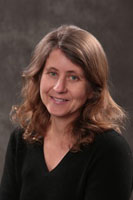
Professor Smythe is an African historian with years of fieldwork experience in Tanzania, East Africa, which resulted in her first book, Fipa Families (2006), and a series of related articles that examined the ways in which Fipa integrated and made sense of European Catholic missionaries and their values during the colonial period.
For more than a decade, she has worked in globalization and economic development, addressing such complex challenges as the viability of the planet’s ecosystems, the viability of the current and projected human populations, and the viability of economic systems focused primarily on production and consumption with little grounding in either biophysical or social and cultural realities. Her work is presented in a second book manuscript, Why We Need African History, A Continent’s Past and Our Future, under review at Indiana University Press.
Recently, in a new book manuscript, she has turned to the Anthropocene. She is examining what we need to know about deep human history in order to explain this phenomenon and then respond intelligently to it.
She has been actively engaged with sustainability efforts at Xavier and now serves as Senior Administrative Fellow for Sustainability and the Environmental Imagination.
Professor Smythe's lecture will be given on Wednesday, November 2, at 6:00 p.m. in Harper 3023. The lecture is free and open to the public.
October 31, 2016
The Word of God, Jesus Christ, and the Eucharist: Christian Hope in a Secular World
Francis J. Moloney, SDB, will lecture on the biblical basis of the Eucharist and its implications in the contemporary world.
Professor Moloney is an internationally renowned scholar and speaker who has taught in Australia, Italy, England, Ireland, Israel, New Zealand, and the USA. He has published over 50 books, and many journal articles, both scholarly and popular. He has been deeply involved in both the life of the church and the university for over 40 years and is currently a Professorial Fellow in the Faculty of Theology and Philosophy at Australian Catholic University.
Professor Moloney's lecture will be given on Monday, October 31 at 4:00 p.m. in the Skutt Student Center, room 104. The lecture is co-sponsored by the Center for Catholic Thought.
October 30-31, 2016
Is Judaism Democratic? Reflections from Theory and Practice Throughout the Ages
The Twenty-Ninth Annual Klutznick Symposium on Jewish Civilization is a collaboration of the Kripke Center with the Klutznick Chair in Jewish Civilization at Creighton, the Harris Center for Judaic Studies at the University of Nebraska-Lincoln, and the Schwalb Center for Israel and Jewish Studies at the University of Nebraska-Omaha.
For further information on the symposium, see the website of the Klutznick Chair in Jewish Civilization.
The proceedings of the symposium will be published in the Studies in Jewish Civilization series.
April 12, 2016
What Can Christians Learn about the New Testament from Jews?
Rabbi David Fox Sandmel will address what Christians can learn about the New Testament from Jews.
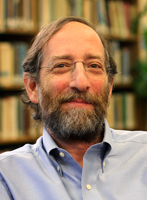 Rabbi Sandmel, a scholar of Jewish-Christian relations and interfaith activist, has served as Director of Interfaith Affairs at the Anti-Defamation League since 2014. From 2003-2014, he held the Crown-Ryan Chair in Jewish Studies at the Catholic Theological Union in Chicago. Rabbi Sandmel earned his doctorate in Religious Studies at the University of Pennsylvania. He received his Rabbinic Ordination and Masters in Hebrew Literature from the Hebrew Union College-Jewish Institute of Religion in Cincinnati. He holds a B.A. in Jewish Studies from Ohio State University. He was the Judaic Scholar at the Institute for Christian & Jewish Studies in Baltimore, where he managed the project that produced “Dabru Emet: A Jewish Statement on Christians and Christianity.” He is an editor of Christianity in Jewish Terms and Irreconcilable Differences? A Learning Resource for Jews and Christians. His commentary on First Thessalonians appears in The Jewish Annotated New Testament.
Rabbi Sandmel, a scholar of Jewish-Christian relations and interfaith activist, has served as Director of Interfaith Affairs at the Anti-Defamation League since 2014. From 2003-2014, he held the Crown-Ryan Chair in Jewish Studies at the Catholic Theological Union in Chicago. Rabbi Sandmel earned his doctorate in Religious Studies at the University of Pennsylvania. He received his Rabbinic Ordination and Masters in Hebrew Literature from the Hebrew Union College-Jewish Institute of Religion in Cincinnati. He holds a B.A. in Jewish Studies from Ohio State University. He was the Judaic Scholar at the Institute for Christian & Jewish Studies in Baltimore, where he managed the project that produced “Dabru Emet: A Jewish Statement on Christians and Christianity.” He is an editor of Christianity in Jewish Terms and Irreconcilable Differences? A Learning Resource for Jews and Christians. His commentary on First Thessalonians appears in The Jewish Annotated New Testament.
Rabbi Sandmel’s lecture will be given Tuesday, April 12 at 6:00 p.m. in Harper Center 3028. The lecture is free and open to the public; it is co-sponsored by the ADL-CRC Plains States Region.
April 7-8, 2016
Augustine in Christian Thought, Life, and Practice
Scholars from around the world will gather to present their scholarship on Augustine in memory of Fr. William Harmless, S.J. The papers of the symposium will be published in the Journal of Religion & Society’s supplement series as a memorial to honor the life and work of Fr. Harmless.
The schedule of the symposium, including the titles of the presentations, can be found here.
The symposium will take place from 8:30 – 5:00 on Thursday and Friday, April 7-8, in the Harper Center 3029. The symposium is open to the public.
February 18-19, 2016
Symposium on Religion and Politics
This symposium will bring together scholars from Creighton and around the country to address the many ways in which religion and politics intersect. The papers will address theoretical and historical issues, as well as a wide range of contemporary issues such as the environment and climate change; the role of religion in political reform; the religious "nones" and secularization; Gay marriage; income inequality, poverty, and the "safety-net"; changing religious demographics; political Islamism; religious freedom and persecution; and other issues.
The schedule of the symposium, including the titles of the presentations, can be found here.
The symposium will be held February 18-19 in Harper Center 3029, 8:30 a.m. – 5:30 p.m.
September 10, 2015
The Climate Encyclical: Global Ethics in the Age of Humans
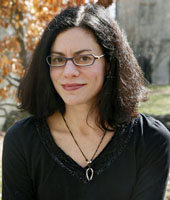 Dr. Lisa Sideris of Indiana University will present a talk on Pope Francis’ new encyclical on the environment for the center's Religion and the Environment lecture series.
Dr. Lisa Sideris of Indiana University will present a talk on Pope Francis’ new encyclical on the environment for the center's Religion and the Environment lecture series.
Professor Sideris' research broadly focuses on the intersection of religion, science, and environmental ethics. She addresses how religious environmental thought incorporates, or fails to incorporate, knowledge gained from the natural sciences, particularly evolutionary theory and ecology. She is the author of Environmental Ethics, Ecological Theology, and Natural Selection (Columbia, 2003), and co-editor of Rachel Carson: Legacy and Challenge (SUNY, 2008). Her recent research is on the role of wonder and enchantment in (and with) science, nature, and religion, and the variety of ways in which scientific narratives, particularly those involving evolution, are being “re-enchanted” and recast as mythopoeic stories with moral content.
The lecture will be given on Thursday, September 10 at 6:00 p.m. in Harper Center 3028. The lecture is free and open to the public.
March 24, 2015
Adam and Eve: Returning to Eden
The annual Women and Religion lecture will be held on Tuesday, March 24 at 7:00 p.m. in the Harper Center Ballroom. This year's guest lecturer is Professor Amy-Jill Levine.
 Amy-Jill Levine is University Professor of New Testament and Jewish Studies, E. Rhodes and Leona B. Carpenter Professor of New Testament Studies, and Professor of Jewish Studies at Vanderbilt Divinity School and College of Arts and Sciences. Her books include The Misunderstood Jew: The Church and the Scandal of the Jewish Jesus (HarperOne), the edited collection,The Historical Jesus in Context (Princeton), and the thirteen-volume edited series, Feminist Companions to the New Testament and Early Christian Writings (Continuum). With Marc Brettler of Brandeis University, she edited the Jewish Annotated New Testament (Oxford). She has written, with her Vanderbilt colleague Douglas Knight, The Meaning of the Bible: What The Jewish Scriptures and the Christian Old Testament Can Teach us (HarperOne); with Warren Carter of Brite Divinity School, she published in 2013 The New Testament: Methods and Meanings (Abingdon). Her most recent book is Short Stories by Jesus: the Enigmatic Parables of a Controversial Rabbi (HarperOne). Professor Levine combines historical-critical rigor, literary-critical sensitivity, and a frequent dash of humor with a commitment to eliminating anti-Jewish, sexist, and homophobic theologies.
Amy-Jill Levine is University Professor of New Testament and Jewish Studies, E. Rhodes and Leona B. Carpenter Professor of New Testament Studies, and Professor of Jewish Studies at Vanderbilt Divinity School and College of Arts and Sciences. Her books include The Misunderstood Jew: The Church and the Scandal of the Jewish Jesus (HarperOne), the edited collection,The Historical Jesus in Context (Princeton), and the thirteen-volume edited series, Feminist Companions to the New Testament and Early Christian Writings (Continuum). With Marc Brettler of Brandeis University, she edited the Jewish Annotated New Testament (Oxford). She has written, with her Vanderbilt colleague Douglas Knight, The Meaning of the Bible: What The Jewish Scriptures and the Christian Old Testament Can Teach us (HarperOne); with Warren Carter of Brite Divinity School, she published in 2013 The New Testament: Methods and Meanings (Abingdon). Her most recent book is Short Stories by Jesus: the Enigmatic Parables of a Controversial Rabbi (HarperOne). Professor Levine combines historical-critical rigor, literary-critical sensitivity, and a frequent dash of humor with a commitment to eliminating anti-Jewish, sexist, and homophobic theologies.
The Women and Religion lecture will be given on Tuesday, March 24, at 7:00 p.m. in the Harper Center Ballroom. The lecture is free and open to the public.
March 20-21, 2015
Rocky Mountain – Great Plains Regional Meeting
The Kripke Center is hosting the annual meeting of the Rocky Mountain – Great Plains region of the American Academy of Religion and Society of Biblical Literature (along with the American Schools of Oriental Research). The conference will be held on Friday and Saturday, March 20-21 in Harper Center, third floor meeting rooms.
The conference is open to all those interested in the professional study of religion, Bible, and Near Eastern Studies.
February 19-20, 2015
Symposium on Religion and Identity
This symposium will bring together scholars from Creighton and around the country to address the many ways in which religion and identity interact, whether it be the formation of a specific religious identity, or the many ways in which religion contributes to or is shaped by Identity.
The schedule of the symposium, including the titles of the presentations, can be found here.
The symposium will be held February 19-20 in Harper Center 3029, 8:30 a.m. – 5:30 p.m.
October 24-25, 2014
U.S. Empire and Religion Seminar
The Kripke Center hosted this seminar of scholars in American religion for his second working meeting, bringing scholars from around the country to Omaha to share their research and work together on a book project.
April 9, 2014
Simone Weil: Love of God, Affliction, and a New Saintliness
The Twelfth annual Women and Religion Lecture will address the life and thought of Simone Weil.
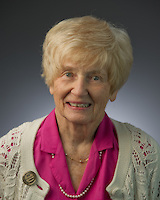 Simone Weil (1909–1943) was a Twentieth Century French philosopher, mystic, social activist and educator, who dedicated her life to an analysis of the malaise she sensed in modern technological society. As a child, she was deeply affected by the terrible human cost exacted by World War I, and then later, by the Spanish Civil War, all of which was followed by the explosion of mindless violence in the Second World War. Her life-long struggle to seek equal justice for all human beings and her compassion for the sufferings of the poor and oppressed were a prelude to the transformation of her thought after her mystical experiences. Weil envisioned a society where mutual respect allows its members to develop their full potential through some creative work that makes a positive contribution to the community. She felt that the true measure of any society is in its treatment of those on the lowest rung of the social ladder. Simone Weil was deeply concerned about the disappearance of values in contemporary society and sought ways to instill a nurturing spiritual dimension integral to every aspect of community. In this talk, we will explore how her whole life leads up to her exploration of the topic: God’s love for His creation and the existence of extreme suffering.
Simone Weil (1909–1943) was a Twentieth Century French philosopher, mystic, social activist and educator, who dedicated her life to an analysis of the malaise she sensed in modern technological society. As a child, she was deeply affected by the terrible human cost exacted by World War I, and then later, by the Spanish Civil War, all of which was followed by the explosion of mindless violence in the Second World War. Her life-long struggle to seek equal justice for all human beings and her compassion for the sufferings of the poor and oppressed were a prelude to the transformation of her thought after her mystical experiences. Weil envisioned a society where mutual respect allows its members to develop their full potential through some creative work that makes a positive contribution to the community. She felt that the true measure of any society is in its treatment of those on the lowest rung of the social ladder. Simone Weil was deeply concerned about the disappearance of values in contemporary society and sought ways to instill a nurturing spiritual dimension integral to every aspect of community. In this talk, we will explore how her whole life leads up to her exploration of the topic: God’s love for His creation and the existence of extreme suffering.
Elizabeth Jane Doering is a Professor Emerita of the University of Notre Dame, and has been reading French philosopher Simone Weil for over two decades with a particular interest in her social and political ideas and how that thought evolved after her mystical experience. As member and officer in both the American Weil Society and the international Association pour l’étude de la pensée de Simone Weil, Prof. Doering strives to facilitate communication among Weil scholars around the globe. Her publications include The Christian Platonism of Simone Weil (2004), Simone Weil and the Specter of Self-perpetuating Force (2010), and over three dozen articles on the multi-dimensional thought of Simone Weil. A recipient of many research grants, she is also very proud to have received the Notre Dame Kaneb Teaching Award. E. Jane Doering is presently extending her research to include Raïssa Maritain and Flannery O’Connor as contemporaries of Simone Weil.
The lecture will be given on Wednesday evening, April 9, at 6:30 in the Harper Center Ballroom. The lecture is co-sponsored by the Women and Gender Studies Program.
February 20-21, 2014
Symposium on Religion and the Sciences: Opportunities and Challenges
Scholars in many fields of religious and theological studies have used the sciences to address a number of issues and attempt to answer a variety of questions with which they are confronted. This symposium will explore the intersection of religious/theological inquiry with the social and natural sciences and how religion scholars use the sciences to address issues of human sexuality, cosmology, the environment, social ethics, epistemology, and others.
The schedule of the symposium, including the titles of the presentations, can be found here.
The symposium will be held February 20-21 in Harper Center 3029, 8:30 a.m. – 5:30 p.m.
November 16, 2013
Reconciliation and Dialogue: In Celebration of the Lutheran-Mennonite Accord
In 2010, the Lutheran World Federation, on behalf of its members, issued a formal apology for the past persecution of Anabaptists/Mennonites, who were often non-conformist religious minorities in Lutheran territories during the Reformation. Lutherans also acknowledged that their subsequent practices perpetuated negative stereotypes of Anabaptists/Mennonites and thus contributed to ongoing hostility. This apology was graciously accepted by the Mennonite World Conference with an invitation to move forward together in future dialogue. Guidelines for implementing this reconciliation on a local level were published in 2013. Moreover, Roman Catholics have been in fruitful dialogue with the Anabaptists/Mennonites in many justice and non-violent protest methods. These three ecclesial communions – Mennonite, Lutheran, and Roman Catholic – have engaged in ongoing trilateral dialogues in an effort to reach further harmony and cooperation.
This program celebrates this trilateral dialogue by bringing three scholars active in the process. The speakers will address the historic nature of the conflict, the details of the agreement, and how each communion envisions future dialogue and local implementation.
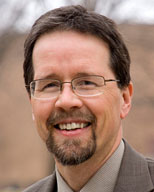 |
 |
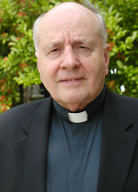 |
John Roth |
Kathryn L. Johnson |
John Radano |
The program for the meeting is as follows:
10:00 – 12:15: Presentations by the speakers
12:30 – 1:15: Lunch and small group discussion
1:30 –2:30: Liturgy of the Word for Reconciliation
The dialogue will take place on Saturday, November 16, in the Fellowship Hall of Kountze Memorial Lutheran Church, located at 2650 Farnam Street (free parking on the west side of the church).
The entire event, including lunch, is free and open to the public.
October 10, 2013
The Racialization of Islam and U.S. Empire: Implications for Scholarship on American Religions
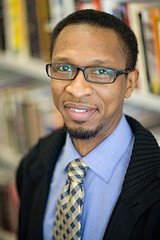 Dr. Sylvester Johnson will open the Kripke Seminar on Religion and U.S. Empire with a public lecture addressing the racialization of Islam and its relationship to the U.S. Empire.
Dr. Sylvester Johnson will open the Kripke Seminar on Religion and U.S. Empire with a public lecture addressing the racialization of Islam and its relationship to the U.S. Empire.
Dr. Johnson is Associate Professor of African American Studies and Religious Studies at Northwestern University. He is the author of The Myth of Ham in Nineteenth-Century American Christianity: Race, Heathens, and the People of God (2004). He is currently working on a history of colonialism and African American religions, which examines the complicated relationship between black religions and colonialism as a historic and on-going American phenomenon both within and beyond U.S. borders. He is one of the facilitators for the Kripke Seminar.
Dr. Johnson’s lecture will be given Thursday, October 10, at 7:00 p.m. in Harper Center 3027. Although the seminar is limited only to participating scholars, the lecture is open to the public.
October 3, 2013
Science as Myth: Ecospirituality in the Anthropocene Age
 Dr. Lisa Sideris of Indiana University will deliver the Religion and the Environment Lecture addressing the role of science on religion and Dark Green Religion.
Dr. Lisa Sideris of Indiana University will deliver the Religion and the Environment Lecture addressing the role of science on religion and Dark Green Religion.
Dr. Sideris' research broadly focuses on the intersection of religion, science, and environmental ethics. She addresses how religious environmental thought incorporates, or fails to incorporate, knowledge gained from the natural sciences, particularly evolutionary theory and ecology. She is the author of Environmental Ethics, Ecological Theology, and Natural Selection (Columbia, 2003), and co-editor of Rachel Carson: Legacy and Challenge (SUNY, 2008). Her recent research is on the role of wonder and enchantment in (and with) science, nature, and religion, and the variety of ways in which scientific narratives, particularly those involving evolution, are being “re-enchanted” and recast as mythopoeic stories with moral content.
Her lecture will be given on Thursday, October 3, at 6:30 p.m. in Harper Center 3023.
September 19, 2013
“Marriage Is Half of Your Religion”: Negotiating Gender, Sexuality, and Matrimony in American Muslim Communities
The Eleventh Annual Women and Religion Lecture will be presented by Prof. Juliane Hammer on Muslim gender and marriage relations.
Juliane Hammer is assistant professor of religious studies and Kenan Rifai Fellow in Islamic studies at the  University of North Carolina at Chapel Hill. She specializes in the study of American Muslims, contemporary Muslim thought, women and gender in Islam, and Sufism. She has taught at Elon University, UNC Charlotte, George Mason University, and Princeton University. Her publications include Palestinians Born in Exile: Diaspora and the Search for a Homeland (2005), a co-edited volume on "Critiques of the West in Iran, Turkey and Japan" in Comparative Studies of South Asia, Africa and the Middle East (2006), and another volume on "Muslims and Media" in Contemporary Islam (2010). Her most recent book, American Muslim Women, Religious Authority, and Activism: More Than a Prayer (2012) examines gender discourses in American Muslim communities through the writings of American Muslim women and with a focus on the 2005 woman-led and mixed-gender congregation Friday prayer in New York City. She is currently working on a book project focusing on American Muslim efforts against domestic violence, and on a larger project exploring American Muslim discourses on marriage, family, and sexuality. She is also the co-editor of the forthcoming Cambridge Companion to American Islam and of an online volume honoring the academic and activist achievements of Professor Amina Wadud, called A Jihad for Justice, which is a free e-book available online.
University of North Carolina at Chapel Hill. She specializes in the study of American Muslims, contemporary Muslim thought, women and gender in Islam, and Sufism. She has taught at Elon University, UNC Charlotte, George Mason University, and Princeton University. Her publications include Palestinians Born in Exile: Diaspora and the Search for a Homeland (2005), a co-edited volume on "Critiques of the West in Iran, Turkey and Japan" in Comparative Studies of South Asia, Africa and the Middle East (2006), and another volume on "Muslims and Media" in Contemporary Islam (2010). Her most recent book, American Muslim Women, Religious Authority, and Activism: More Than a Prayer (2012) examines gender discourses in American Muslim communities through the writings of American Muslim women and with a focus on the 2005 woman-led and mixed-gender congregation Friday prayer in New York City. She is currently working on a book project focusing on American Muslim efforts against domestic violence, and on a larger project exploring American Muslim discourses on marriage, family, and sexuality. She is also the co-editor of the forthcoming Cambridge Companion to American Islam and of an online volume honoring the academic and activist achievements of Professor Amina Wadud, called A Jihad for Justice, which is a free e-book available online.
Prof. Hammer’s lecture will be given in Hixson-Lied Science Building, room G04, at 7:00 p.m.
September 5, 2013
Religion in the Workplace: A Support for Ethics or an Obstacle to Business?
Professor Robert Audi will present the first Business, Faith, and Society Lecture.
 Professor Audi is the John A. O’Brien Professor of Philosophy and Professor of Management, University of Notre Dame. He is an internationally known philosopher and ethicist who has published more than130 journal articles and 16 books including Business Ethics and Ethical Business; Religion in the Public Square; Religious Commitment and Secular Reason; and Democratic Authority and the Separation of Church and State. He is the past president of the American Philosophical Associtaion, and the Society of Christian Philosophers, and editor of the Cambridge Dictionary of Philosophy.
Professor Audi is the John A. O’Brien Professor of Philosophy and Professor of Management, University of Notre Dame. He is an internationally known philosopher and ethicist who has published more than130 journal articles and 16 books including Business Ethics and Ethical Business; Religion in the Public Square; Religious Commitment and Secular Reason; and Democratic Authority and the Separation of Church and State. He is the past president of the American Philosophical Associtaion, and the Society of Christian Philosophers, and editor of the Cambridge Dictionary of Philosophy.
His lecture will be given on Thursday, September 5, at 7:30 p.m. in Harper Center 3023. This lecture is co-sponsored by the Creighton College of Business.
April 23, 2013
The Aryan Jesus in Nazi Germany: The Bible and the Holocaust
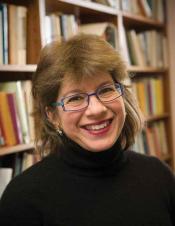 The Kripke Center’s Holocaust Lecture will be given by Prof. Susannah Heschel.
The Kripke Center’s Holocaust Lecture will be given by Prof. Susannah Heschel.
Susannah Heschel is the Eli Black Professor of Jewish Studies at Dartmouth College. Her scholarship focuses on Jewish-Christian relations in Germany during the 19th and 20th centuries, the history of biblical scholarship, and the history of anti-Semitism. Her numerous publications include Abraham Geiger and the Jewish Jesus (University of Chicago Press), which won a National Jewish Book Award and Germany's Geiger Prize, and The Aryan Jesus: Christian Theologians and the Bible in Nazi Germany (Princeton University Press). She is the author of over seventy articles and has edited several books, including Betrayal: German Churches and the Holocaust (with Robert P. Ericksen).
Prof. Heschel has received grants from the Ford Foundation and the Carnegie Foundation; she has been a Rockefeller Fellow at the National Humanities Center. She has been a visiting scholar at numerous universities and has been awarded several honorary doctorates.
Prof. Heschel’s lecture will be given on Tuesday, April 23, at 7:00 p.m. in the Harper Center 3023. Listen to her lecture here. See her lecture on You-Tube Here.
February 14-15, 2013
The Bible, the Economy, and the Poor
This year's Kripke Symposium will raise the question of the relationship between the Bible and its concern for the poor in its ancient economic context and concern for the poor in our contemporary economic context. The symposium will thus address the role of the poor and the economy in the biblical tradition from historical and social perspectives, and offer theological and ethical responses from contemporary contexts.
The symposium participants and the title and time of their presentations are listed on the symposium poster linked HERE.
The symposium will be held on Thursday and Friday, February 14-15, from 8:30 – 5:00 in the Harper Center 3029.
November 28, 2012
Redemption, Messianic Time, and Historical Transformation: Walter Benjamin’s Political Theology
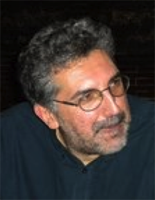 Dr. Massimiliano Tomba will address the work of Walther Benjamin (1892-1940), who was a German-Jewish philosopher and literary critic associated with Georg Lukacs and the Frankfurt School of critical theory. He was friends with Gershom Scholem, who explored Messianic themes and Jewish mysticism.
Dr. Massimiliano Tomba will address the work of Walther Benjamin (1892-1940), who was a German-Jewish philosopher and literary critic associated with Georg Lukacs and the Frankfurt School of critical theory. He was friends with Gershom Scholem, who explored Messianic themes and Jewish mysticism.
Massimiliano (Max) Tomba is Senior Researcher in Political Philosophy in the Department of Political and Juridical Sciences and International Studies at the University of Padua in Italy. Dr. Tomba earned his Ph.D. in Political Philosophy in 2000 from the University of Pisa. He has lectured widely in the Italian- and the English-speaking worlds. This fall he is a Visiting Scholar at Columbia University in New York City.
Dr. Tomba’s research interests include German classical philosophy, political Philosophy, critical theory, philosophies of history, Marxist and Post-Marxist thought, and human rights. He is a prolific writer in Italian and English. He has published three books and edited seven others, most recently Marx’s Temporalities (Brill). He is presently working on a book-length manuscript, “The Unhistorical Present: Exit Strategy,” on the concept of time, space, and the transcendental subject in the contemporary crisis of experience and global political space.
Dr. Tomba’s lecture will be on Wednesday, November 28 at 6:30 p.m. in Harper Center 3029.
October 28-29, 2012
Who is a Jew?
The Twenty-Fifth Annual Klutznick-Harris Symposium will explore the question of who is a Jew. The two day symposium, drawing speakers from around the United States and abroad will be held at the Jewish Community Center on Sunday, October 28. On Monday, October 29, the sessions will be held at Creighton University in the Skutt Student Center Ballroom.
For further information, see the website of the Klutznick Chair in Jewish Civilization.
The proceedings of the symposium will be published in the Studies in Jewish Civilization series.
October 5, 2012
Re-Describing Earliest Christianity as a Religion of Independent Specialists
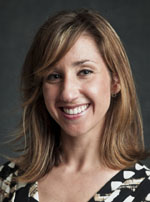 Heidi Wendt will present a new assessment of early Christian leaders (such as St. Paul) in the Roman Empire based on her doctoral research.
Heidi Wendt will present a new assessment of early Christian leaders (such as St. Paul) in the Roman Empire based on her doctoral research.
Heidi Wendt is a Ph.D. candidate in Religious Studies at Brown University with specialties in Roman religion and earliest Christianity. For the past year she held a Rome Prize in Ancient Studies at the American Academy in Rome, where she was working on a dissertation that assembles evidence for entrepreneurial religion at Rome in the early imperial period. Though many of the figures and practices that populate her case studies also comprise categories like magic, astrology, mystery cults, and Judaism, she offers an analysis of the religion of independent specialists that cuts across its assorted permutations. Her wider interests include contextualizing evidence for earliest Christianity and redescribing Paul and his epistles with a view to broader patterns of independent specialist activity.
Heidi Wendt’s lecture will be given on Friday, October 5 at 3:30 p.m. in the Skutt Student Center 104.
September 27, 2012
Serving the Crucified People: Justice-based Duties to Promote Environmental Justice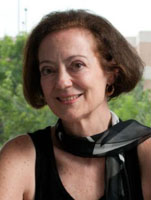
Professor Kristin Shrader-Frechette will deliver the third annual Religion & the Environment Lecture. Prof. Shrader-Frechette is the O’Neill Family Endowed Professor at Notre Dame, where she teaches in the Departments of Biological Sciences and Philosophy, and is director of the Center for Environmental Justice and Children’s Health. She is the author of 16 books and over 380 articles. In 2004, Prof. Shrader-Frechette became only the third American to win the World TechnologyAward in Ethics for her work in public-health and environmental ethics. In 2007, Catholic Digest named her one of 12 “Heroes for the US and the World” because of her pro-bono environmental-justice work with minority and poor communities.
Professor Shrader-Frechette will deliver her lecture on Thursday, September 27 at 6:30 in the Harper Center Ballroom.
April 29, 2012
Christian-Muslim Study Circle
Join us as we examine A Common Word Between Us and You, a document written by 138 Muslim scholars from around the world highlighting the common ground between Islam and Christianity based on Islamic teachings. This document will be explored alongside Loving God and Neighbor Together: A Christian Response to A Common Word Between Us and You, a document signed by over 300 Christian scholars as a way of endorsing continued interaction between the two faith communities. Scholars from both the Islamic and Christian traditions will explore the passages from each religion's sacred texts that are referenced in the documents to help shed light on how each tradition views interreligious engagement.
The study circle will be Sunday, April 29, from 2:00 p.m. to 5:00 p.m. in the Harper Center Ballroom. The event is free and open to the public, but registration is required (limited space is available).
April 19, 2012
The Trial of Franklin D. Roosevelt
Creighton University and the Omaha Jewish Community are hosting an original, live docu-drama about the 1939 ill-fated voyage of the SS St. Louis that carried more than 900 Jewish refugees The performance will be in Creighton University’s Harper Center auditorium at 7:30 p.m., and is free and open to the public.
Four of the remaining 60 survivors of the voyage will be present and participate in the drama, “The Trial of Franklin D. Roosevelt,” created by Robert M. Krakow and directed by Creighton Fine Arts graduate Matt Karasek.
The saga of the SS St. Louis is one of the most significant and symbolic events in the Holocaust and American history and speaks to the contemporary issues of ethics, social justice, immigration, human rights, refugee policy and anti-Semitism. A reception will follow the play. Archival exhibits from the voyage, including the original Senate Resolution 111 that was signed in 2009 by the survivors, will also be on display.
Creighton University, The Institute for Holocaust Education and the Durham Museum are partners in this presentation. This event is co-sponsored by the Klutznick Chair, Kripke Center, Center for Catholic Thought, Graff Chair, the Jesuit Community, and Creighton University's Committee on Lectures, Films and Concerts.
March 26, 2012
All About Eve: The Last Word on the First Lady
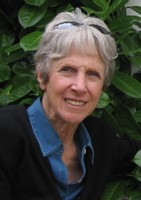 Professor Carol Meyers will deliver the 10th annual Women and Religion Lecture in support of the Women and Gender Studies Program at Creighton University.
Professor Carol Meyers will deliver the 10th annual Women and Religion Lecture in support of the Women and Gender Studies Program at Creighton University.
Professor Meyers was educated at Wellesley and at Brandeis, where she received her Ph.D. (1975) in Near Eastern and Judaic Studies. She holds the Mary Grace Wilson Professorship in Religion at Duke University, where she has taught since 1977. A specialist in biblical studies and archaeology, she is a prominent scholar in the study of women in the biblical world. She has authored or co-authored eleven books and has edited or co-edited five others. With Eric Meyers, she has published three major archaeological reports and is working on several more. Her book Discovering Eve is a landmark study of women in ancient Israel; and her recent reference book, Women in Scripture, is the most comprehensive study ever made of women in Jewish and Christian scriptures.
Professor Meyers will deliver her lecture on Monday, March 26 at 7:00 p.m. in the Harper Center Ballroom. You can listen to her lecture here.
March 14, 2012
Roots of the Conflict between Religion and Evolutionary Theory
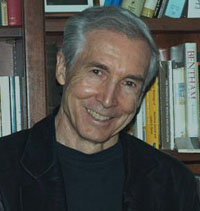 Professor Robert Richards will deliver a lecture in the center’s occasional Religion and Science Lecture series.
Professor Robert Richards will deliver a lecture in the center’s occasional Religion and Science Lecture series.
Professor Richards is the Morris Fishbein Distinguished Service Professor of the History of Science and Medicine at the University of Chicago. He is also the Director of the Fishbein Center for the History of Science and Medicine. His research is in the history and philosophy of psychology and biology, which includes particular interest in evolutionary theory, biopsychology, ethology, and sociobiology. He has written several books, including The Tragic Sense of Life: Ernst Haeckel and the Struggle over Evolutionary Thought (2008), The Romantic Conception of Life: Science and Philosophy in the Age of Goethe (2002), and The Meaning of Evolution: The Morphological Construction and Ideological Reconstruction of Darwin's Theory (1992). He is currently working on a historical and philosophical commentary on Darwin’s Origin of Species.
Professor Richards will deliver his lecture on Wednesday, March 14 at 7:00 p.m. in the Harper Center 3028. You can listen to his lecture here.
February 16-17, 2012
The Greening of the Papacy
Since the pontificate of John Paul II, official papal documents have displayed a steadily increasing awareness of environmental issues. This trend has continued in the writings of Pope Benedict XVI. Indeed, one could argue that the encyclical Caritas in Veritate contains the most forceful statements about the environment every made by a sitting pope. Other equally forceful statements appear in less significant statements, including the World Day of Peace message of 2010. When taken together, these statements represent a significant “greening” of the papacy.
This symposium will consider this green trend and evaluate it in the light of contemporary academic conversations about the environment. Participants from a variety of disciplines and perspectives will be invited to dialogue with this evolving papal teaching.
See the Poster and Schedule for the symposium here.
The symposium will be held on Thursday and Friday, February 16-17, from 8:30 – 5:00 in the Harper Center 3029.
November 2, 2011
From the King James Bible to Biblezines: The History of a Cultural Icon
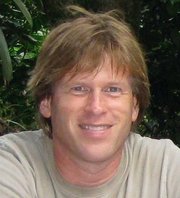 Professor Timothy Beal will give a lecture in celebration of the 400th anniversary of the King James Bible.
Professor Timothy Beal will give a lecture in celebration of the 400th anniversary of the King James Bible.
Timothy Beal is the Florence Harkness Professor of Religion at Case Western Reserve University. He has published twelve books and many scholarly articles on the cultural history of the Bible, religion and popular culture, and relations between critical theory and academic religious studies. Two notable recent books include Biblical Literacy: Essential Bible Stories Everyone Needs to Know (2009) and The Rise and Fall of the Bible: The Unexpected History of an Accidental Book (2011). He has also published essays on religion and American culture for The New York Times, The Chronicle of Higher Education, The Washington Post, The Huffington Post, and The Cleveland Plain Dealer. He has been featured on national radio shows including NPR’s All Things Considered and The Bob Edwards Show.
Professor Beal will give his lecture on Wednesday, November 2 at 4:00 p.m. in the Harper Center Ballroom You can listen to his lecture here.
October 23-24, 2011
Fashioning Jews: Clothing, Culture, and Commerce
The Twenty-Fourth Annual Klutznick-Harris Symposium will explore the role of fashion in Jewish life and tradition. The two day symposium, drawing speakers from around the United States and abroad will be held at the Jewish Community Center on Sunday, October 23. On Monday, October 24, the sessions will be held at Creighton University in the Skutt Student Center Ballroom.
For further information, see the website of the Klutznick Chair in Jewish Civilization.
The proceedings of the symposium will be published in the Studies in Jewish Civilization series.
September 22, 2011
Why Care for the Earth?: Ten Good Reasons
The second annual Religion and the Environment Lecture will feature Professor Steven Bouma-Prediger, who will explain why the care for the environment is a religious concern.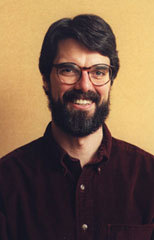
Steven Bouma-Prediger is Professor of Religion and Director of the Environmental Studies Program at Hope College. He has written four books concerning ecology and theology. His most recent, For the Beauty of the Earth, won an Award of Merit from Christianity Today in the theology/ethics category of the magazine’s 2002 Book Awards program. In December of 2000, his book Evocations of Grace: Writings on Ecology, Theology, and Ethics, which he co-edited with Peter Bakken, was one of only five books named editor’s picks book of the year by Christian Century. His other books are The Greening of Theology: The Ecological Models of Rosemary Radford Ruether, Joseph Sittler, and Jurgen Moltmann and, with Virginia Vroblesky, Assessing the Ark: A Christian Perspective on Nonhuman Creatures and the Endangered Species Act.
Professor Bouma-Prediger regularly leads wilderness backpacking and canoeing trips for a course on ecological theology and ethics that he co-teaches in the Adirondacks in upstate New York during Hope College’s May term.
Professor Bouma-Prediger’s lecture will be given on Thursday, September 22 at 4:00 p.m. in the Skutt Student Center Ballroom. Listen to the lecture here.
March 31-April 1, 2011
Religion and the Visual
The spring Kripke Symposium will involved numerous scholars, presenting a broad range of interdisciplinary perspectives that address diverse visual ways in which the sacred is communicated.
The following papers will be presented at the symposium:
Thursday, March 31, 8:30–5:00
- Erin Averett, “Prayers in Clay: the Votive Figurines from Athienou-Malloura Sanctuary on Cyprus”
- Greg Carlson, “Three Revealing Moments in the Visual Intersection of Religion and Fables”
- Mark George, “Blueprint? Sacred Space? Museum Guide? Visualizing the Tabernacle Narratives of Exodus”
- Ronald Simkins, “Visual Ambiguity in the Biblical Tradition”
- Nicolae Roddy, “And the Blue Became Red and Dwelt Among Us: Mapping Boundaries of Meaning in Eastern Orthodox Iconography”
- Michael Brown, “Holbein’s Dead Christ and Visual Depiction of Impossibility”
- Matthew Averett, “Bernini at the Piazza Barberini: War and Fountains in the Rome of Pope Urban VIII”
- Joseph Chorpenning, OSFS, “Visual, Verbal, Mental, and Living Images in Early Modern Catholic Spirituality: The Case of Adrien Gambart’s The Life of St. Francis de Sales in Symbols (1664)”
Friday, April 1, 9:30–5:00
- Susan Calef, “‘So be it. . .’: Gender, Family, and Sacrificial Theology Envisioned in Gibson’s The Passion of the Christ”
- William Blizek, “Religion on the Silver Screen”
- Paul Olson, “Religion on Parade: Religiously Themed Entries in Small-Town Parades”
- Colleen McDannell, “Picturing Faith: Photography and the Great Depression”
- Wendy M. Wright, “Irony and Hope: Marian Devotion and the Catholic Imagination”
- John O’Keefe, “God through the camera frame: Backpack Journalism and the Catholic Imagination”
The symposium will take place in the Harper Center room 3028. The symposium is free and open to the public.
March 22, 2011
The Unfinished Agenda: Womanist Contributions and Struggles for Inclusion in the Churches
Sister Jamie T. Phelps, O.P. Ph.D. will deliver the ninth annual Women and Religion Lecture in support of the Women and Gender Studies Program at Creighton University. Listen to her lecture here.
Sr. Phelps is Professor of Systematic Theology and Director of the Institute for Black Catholic Studies of Xavier University of Louisiana. She has edited two books, Black Catholic: The Challenge and Gift of Black Folk and Stamped in the Image of God: African Americans as God’s Image in Black, and has published more than 50 theological articles on issues of the mission of the Church, evangelization, inculturation, Christology, and spirituality.
Sr. Phelps believes in developing institutions to ensure the on-going growth and development of theology and ministry in the Black Catholic Community. She was a founding member of the Washington-based National Black Sisters Conference, a major consultant for the founding of The Institute of Black Catholics Studies, the founding director the Catholic Theological Union’s Augustus Tolton Pastoral Ministry Program which prepares Black Catholic laypersons for ministry, and the re-founder of The Black Catholic Theological Symposium, a national interdisciplinary theological society forBlack-Catholics holding doctoral degrees in theology and related fields.
Sr. Phelp’s lecture will be given on Tuesday, March 22 at 7:00 p.m. in the Harper Center ballroom.
March 15, 2011
The Nature of Humans and the Sanctity of Nature: Why the Dualism-Physicalism Debate Matters for the Environment
Dr. Nancey Murphy will address the relationship between religion and science through a physicalist theory of human nature. Listen to her lecture here.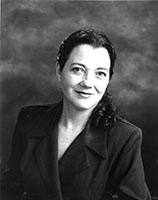
Nancey Murphy is Professor of Christian Philosophy at Fuller Theological Seminary, Pasadena, CA. A graduate of Creighton University (1973), she earned the Ph.D. from U.C. Berkeley (philosophy of science) in 1980, and the Th.D. from the Graduate Theological Union (theology) in 1987.
Her first book, Theology in the Age of Scientific Reasoning (1990) won the American Academy of Religion award for excellence. Most recently she co-edited Downward Causation and the Neurobiology of Free Will (2009). Other recent books include include: Did My Neurons Make Me Do It? Philosophical and Neurobiological Perspectives on Moral Responsibility and Free Will (co-authored with Warren Brown, 2007); Physics and Cosmology: Scientific Perspectives on the Problem of Natural Evil (co-edited with Robert Russell and William Stoeger, SJ, 2007); Evolution and Emergence: Systems, Organisms, Persons (co-edited with William Stoeger, SJ, 2007); and Bodies and Souls, or Spirited Bodies? (2006).
Her research interests focus on the role of modern and postmodern philosophy in shaping Christian theology; on relations between theology and science; and relations between neuroscience and philosophy of mind.
Dr. Murphy’s lecture will be given Tuesday, March 15, at 7:00 p.m. in the Harper Center 3023.
November 22, 2010
Listening to Child Survivors in the Aftermath of the Holocaust
Dr. Boaz Cohen will present the fall lecture for the Kripke Center’s Holocaust Lecture Series.
Dr. Boaz Cohen, is head of the Holocaust Studies Program at Western Galilee Academic College in Israel. He received his Ph.D. from Bar-Ilan University in Israel and is a specialist in children’s
memories/memoirs of the Holocaust and of how these accounts relate to our understanding of the Holocaust. He has published extensively in this area.
Dr. Cohen’s lecture will be presented on Monday, November 22 at 7:00 p.m. in the Harper Center 3028.
October 27-29, 2010
Religion, Health, and Healing
The fall Kripke Symposium will involve numerous scholars, presenting a broad range of interdisciplinary perspectives that address diverse religious understandings and practices of health and healing in specific social, cultural and historical contexts.
Throughout history and across cultures and societies, religious thoughts and practices have been intimately intertwined with health and healing. The presenters at the symposium approach the association between health, healing, and religion informed by various academic disciplines within the humanities, the natural sciences, and the social sciences: anthropology, history, medicine, nursing, philosophy, political science, psychiatry, and theology. Their papers integrate theoretical understandings with historic and current case studies from various geographical and cultural contexts and highlight implications for the practice of medicine, patient care, and religion.
This symposium will begin at 7:00 p.m. on Wednesday, October 27 in the Harper Center Ballroom with a keynote address by medical anthropologist John Janzen, known for his seminal work on healing and religion in Central Africa.
The symposium will continue all day, Thursday and Friday, 8:30 – 5:30, with individual presentations in the Skutt Student Center 105. The symposium is free and open to the public.
October 6, 2010
A Little Good News for a Change: The Promises of Religious Environmentalism
Professor Roger S. Gottlieb will inaugurate the Kripke Center’s new lecture series on Religion and the Environment. Listen to his lecture here.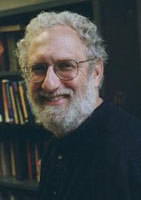
Roger S. Gottlieb is professor of philosophy at Worcester Polytechnic Institute. He is the author or editor of fourteen books and more than 100 articles on political philosophy, environmentalism, ethics, religion, spirituality, the Holocaust, and disability.
For the last fifteen years Gottlieb has concentrated on the political, ethical, and religious dimensions of the environmental crisis and on the broad social and normative connections between religion and politics. His anthology This Sacred Earth: Religion, Nature, Environment (2003) is known internationally as the first comprehensive collection on the topic. is recent work on religious environmentalism, A Greener Faith: Religious Environmentalism and our Planet’s Future (2006) and Oxford Handbook on Religion and Ecology (2006) establishes him as the leading analyst of this unprecedented political, environmental, and religious movement.
Professor Gottlieb will deliver his lecture on Wednesday, October 6 at 7:00 p.m. in the Harper Center ballroom.
September 21, 2010
The Catholic Church and Peace Building in the Democratic Republic of Congo
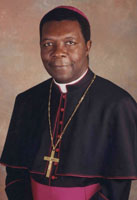 Bishop Nicolas Djomo, President of the National Bishops Conference of the Democratic Republic of Congo, will address religion and violence in the Democratic Republic of Congo.
Bishop Nicolas Djomo, President of the National Bishops Conference of the Democratic Republic of Congo, will address religion and violence in the Democratic Republic of Congo.
Bishop Nicolas Djomo is Bishop of Tshumbe. He earned a doctorate in Psychology at the Sorbonne in Paris in 1981 and has served the Church in Africa as a priest and bishop since. From 2002 to 2007 he was President of the Association of Episcopal Conferences for Central Africa (ACEAC). In July 2008, Bishop Djomo was elected President of the National Episcopal Conference of the Democratic Republic of Congo (CENCO). Since his election, bishop Djomo has launched several peace building initiatives within Condo and the Great Lakes region.
Bishop Djomo is described as an “exceptional, charismatic man with amazing peace building experience.” This “bridge builder” prelate was president of the ACEAC when he worked with Bishops from Uganda, Rwanda and Burundi to end the wars that have been destroying those countries, especially the Congo, for more than a decade, with dire consequences on human lives and rights. He was among the participants in the Synod of Bishops for Africa which met in October 2009.
Bishop Djomo will give his lecture on Tuesday, September 21 at 7:00 p.m. in the Harper Center 3023.
April 8, 2010
Paul was not a Christian: Understanding the Jewish Paul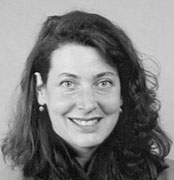
Dr. Pamela Eisenbaum explored the Jewish character of St. Paul, the apostle to the Gentiles.
Dr. Eisenbaum is a Professor of Biblical Studies and Christian Origins at Iliff School of Theology in Denver. She has published widely on Paul, including Paul was not a Christian from HarperCollins (2009). As a Jewish New Testament scholar, she has contributed to understanding early Jewish-Christian relations.
Dr. Eisenbaum’s lecture was given Thursday, April 8, at 7:00 p.m. in the Harper Center room 3029.
March 18, 2010
Green Sisters: Women Religious, Earth Justice, and Spiritual Ecology
Dr. Sarah McFarland Taylor delivered this year’s Women and Religion lecture, addressing the role of women religious in the concern for a sustainable environment.
Dr. Taylor is an Associate Professor of Religious Studies at Northwestern University, specializing in the study of religion and American culture, religion and ecology, and women’s studies in religion. Her first book, Green Sisters: A Spiritual Ecology (Harvard, 2007), was the winner of the Catholic Press Association’s First Prize for Best Book on Gender Issues and also the Association’s First Prize for Best Book on Social Concerns. She has published numerous articles on various topics related to the “greening’ of American religion, and is under contract for her second book on the religious dimensions of the “green burial movement” (ecologically friendly death planning which promotes low-impact, environmentally sound ways to "recycle" human remains). She has also received numerous fellowships and awards for her scholarship.
Dr. Taylor delivered her lecture on Thursday, March 18, at 7:00 p.m. in the Harper Center ballroom. Hear her lecture online here.
February 22, 2010
Reading Scriptures by Way of the Holocaust (Shoah)
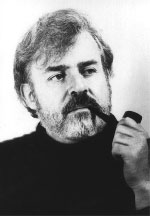 Zev Garber presented the spring lecture for the Kripke Center’s Holocaust Lecture Series.
Zev Garber presented the spring lecture for the Kripke Center’s Holocaust Lecture Series.
Zev Garber is a professor, scholar, and writer who focuses his intellect on the Holocaust, Jewish-Christian relations, history, biblical interpretation, and philosophy. He is formally the Emeritus professor and Chair of Jewish Studies and Philosophy at Los Angeles Valley College. He is the author of numerous books, including, The Impact of the Holocaust in America: The Jewish Role in American Life (2009), Mel Gibson's Passion: The Film, the Controversy, And Its Implications (2006), and Shoah: The Paradigmatic Genocide Essays in Exegesis and Eisegesis (1994).
Dr. Garber gave his lecture on Monday, February 22 at 7:00 p.m. in the Harper Center 3028.
February 6, 10, 2010
Screening and Discussion of The Golden Compass (2007)
In this two-day event, the Kripke Center sponsored a free screening of The Golden Compass, the film based on the first volume of Philip Pullman’s triology. Then, the center hosted a panel discussion on the religious, philosophical, and classical themes in the film.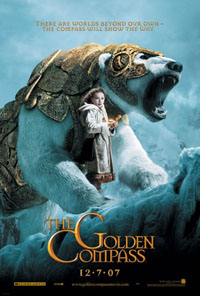
Roger Ebert described The Golden Compass as “a darker, deeper fantasy epic than the Rings trilogy, The Chronicles of Narnia or the Potter films. It springs from the same British world of quasi-philosophical magic, but creates more complex villains and poses more intriguing questions. As a visual experience, it is superb. As an escapist fantasy, it is challenging.
The free sceening of the film was Saturday, February 6 at 7:00 p.m. in the Hixson Lied Science Building G04.
On Wednesday, February 10 at 7:00 p.m. in the Skutt Ballroom East, Ortwin Knorr and Daniel Moloney addressed themes of the film in a panel discussion.
Dr. Ortwin Knorr is Associate Professor and Chair of the Department of Classical Studies at Willamette University in Salem, Oregon. Trained in Göttingen, Heidelberg, and Berkeley, he received his Dr. phil. from the University of Göttingen in Germany. He is the author of a book on Horaces’ Satires (Verborgene Kunst: Argumentationsstruktur und Buchaufbau in den Satiren des Horaz, Hildesheim 2004) and has published articles on Terence, Horace, and early Christian writers. His current work on Philip Pullman is driven by a larger interest in Classical reception in modern literature and film.
Dr. Daniel Moloney is a deacon who will be ordained a priest for the Roman Catholic Archdiocese of Boston this May. Prior to entering the seminary, he was Senior Policy Analyst at the DeVos Center for Religion and Civil Society at The Heritage Foundation, where he studied policy issues affecting family, religion, marriage and civil society. He holds degrees from Yale, the Pontifical University of the Holy Cross in Rome, and Notre Dame, where he earned his doctorate in philosophy in 2004. Many of his numerous articles and book reviews have appeared in The Wall Street Journal, National Review, Crisis and First Things. He has previously published on Philip Pullman in the volume Navigating the Golden Compass (Dallas 2005).
This event was co-sponsored by the Academic Vice-President’s office of Creighton University.
February 3, 2010
 Jews, Gender, and Interfaith Marriage: What Can History Tell Us?
Jews, Gender, and Interfaith Marriage: What Can History Tell Us?
Dr. Keren McGinity addressed the reality and consequences of interfaith marriage between Jews and Gentiles.
Keren R. McGinity is the Mandell L. Berman Postdoctoral Research Fellow in Contemporary American Jewish Life at the University of Michigan’s Frankel Center for Judaic Studies. Previously, she was Visiting Assistant Professor of History at Brown University. She earned her Ph.D. in American Women’s History at Brown University and is the author of Still Jewish: A History of Women and Intermarriage in America (2009).
Dr. McGinity’s lecture was given on Wednesday, February 3, at 7:00 p.m. in the Harper Center Ballroom.
January 19, 2010
Religion and Conflict in Africa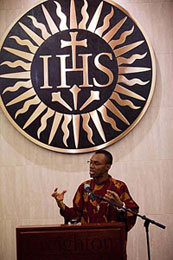
Fr. Agbonkhianmeghe E. Orobator, SJ., the new Provincial of the East African province, gave a lecture on the role of religion in African conflicts.
Recently a lecturer at Hekima College, Jesuit School of Theology, in Nairobi, Kenya, Fr. Orobator completed his Ph.D. in Theology at the University of Leeds, U.K., after studying at the Jesuit School of Theology at Berkeley. He has published numerous articles and written several books, including most recently, Theology Brewed in an African Pot (2008) and Faith Doing Justice: A Manual for Social Analysis, Catholic Social Teachings and Social Justice (2007).
Fr. Orobator’s lecture was given on Tuesday, January 19, at 7:00 p.m. in the Harper Center Ballroom.
Download and listen to Fr. Orobator’s talk here.
October 25-26, 2009
Jews and Humor
The Twenty-Second Annual Klutznick-Harris Symposium explored the role of humor in Jewish life and tradition. The two day symposium, drawing speakers from around the United States and Israel was held at the Jewish Community Center on Sunday, October 25. On Monday, October 26, the sessions were held at Creighton University in the Skutt Student Center Ballroom.
For further information, see the website of the Klutznick Chair in Jewish Civilization.
The proceedings of the symposium will be published in the Studies in Jewish Civilization series.
October 6, 2009
The Holocaust: Its Contemporary Ethical Challenges
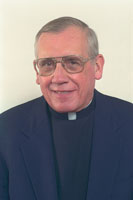 Fr. John Pawlikowski, O.S.M., presented the fall lecture for the Kripke Center’s Holocaust Lecture Series.
Fr. John Pawlikowski, O.S.M., presented the fall lecture for the Kripke Center’s Holocaust Lecture Series.
Fr. Pawlikowski, a priest of the Servite Order, is the author or editor of more than fifteen books, including The Challenge of the Holocaust for Christian Theology, Christ in the Light of the Christian-Jewish Dialogue, and Jesus and the Theology of Israel, and numerous journal articles. His writings have been translated into Russian, Polish, German, French, Italian, Swedish, Czeh, Dutch, and Hungarian.
Fr. Pawlikowski was appointed by President Carter to the United States Holocaust Memorial Council in 1980; reappointed to three successive terms on the Council by Presidents Bush and Clinton. Currently. he serves on the Council’s Committee on Conscience, the Academic Committee, and the Church Relations Committee which he chairs. He served for several years on the Council’s Executive Committee and on the key committees responsible for the construction of the museum building as well as the development of its permanent exhibition. He was selected by President Bush as a member of the White House delegation re-presenting the President on the 50th Anniversary International Commemoration at the Babi Yar Massacre site, Kiev, Ukraine, October 1991. He has received numerous awards for his work in Jewish-Christian relations.
His lecture was given on Tuesday, October 6, at 7:00 p.m. in the Harper Center, Room 3023.
August 28, 2009
Foundations of Dialogue in Abrahamic Faiths
The Kripke Center sponsored a panel discusison on Muslim, Jewish, and Christian perspectives of interfaith dialogue. The panel clarified the religious foundations of dialogue, addressing issues such as mutual respect and understanding, and reflected on how dialogue can best be cultivated. The panel included:
Zeki Saritoprak, Nursi Chair of Islamic Theology at John Carroll University
Leonard Greenspoon, Klutznick Chair in Jewish Civilization at Creighton University
Fr. Raymond Bucko, S.J., Professor of Anthropology at Creighton University
The panel was moderated by Ferhat Ozturk, Executive Director of the Niagara Foundation of Nebraska.
The panel discussion took place on Friday, August 28 at 3:30 in Room 3023 of the Harper Center.
April 14, 2009
Ethics, Empathy, and Wonder: Rachel Carson’s Environmental Legacy
Dr. Lisa Sideris of Indiana University delivered the Women and Religion Lecture on enduring legacy of Rachel Carson, whose book Silent Spring (1962) marks the beginning of the environmental movement in America.
Dr. Sideris’ research broadly focuses on the intersection of religion, science, and environmental ethics. She addresses how religious environmental thought incorporates, or fails to incorporate, knowledge gained from the natural sciences, particularly evolutionary theory and ecology. She is the author of Environmental Ethics, Ecological Theology, and Natural Selection (Columbia, 2003). Her recent research is on the legacy of Rachel Carson’s work.
Download and listen to Dr. Sideris’ talk here.
The Women and Religion Lecture was given on Tuesday, April 14 at 7:00 p.m. in the Harper Center ballroom.
March 29, 2009
Faith and the Environment: Christian, Jewish, Muslim, and Native American Ways of Approaching Environmental Issues
The Kripke Center sponsored a conference on how faith can inspire us to improve our environment. The faith traditions of Judaism, Christianity, Islam, and Native American religion will be considered. Speakers include:
Terry Wimberley: A Christian Perspective
Sandra Beth Lubarsky: A Jewish Perspective
Safei-Eldin A. Hamed: A Muslim Perspective
Rudy Mitchell: A Native American Perspective
The conference was held in the Harper Center Ballroom, Sunday, March 29, from 1:00 – 5:00 p.m. The conference is free and open to the public, but pre-registration is required.
March 26, 2009
Carolyn Forché: Poet of Witness
The Kripke Center co-sponsored an evening with Carolyn Forché, who will read from her works. Her reading will take place on Thursday evening, March 26 at 6:30 p.m. in Ballroom C of the Harper Center. The event is free and open to the public.
The event was co-sponsored with the John C. Kenefick Chair in the Humanities.
March 17, 2009
Eyewitness to Genocide: Worshop with Carl Wilkens
The Kripke Center co-sponsored a workshop with Carl Wilkins, the only American to choose to remain in Rwanda when the genocide began, for educators, faculty, and students will address: The lessons from Rwanda and seeing the experience through new eyes.
The workshop was held Tuesday, March 17, from 4:30 – 7:30 p.m. in the Harper Center, Room 3023. A light supper was provided.
November 12, 2008
The Impact of the Holocaust on Christian Theology
Professor Mary C. Boys spoke on the impact that the Holocaust has had and should have on Christian theology for this year’s Holocaust Lecture Series.
Mary Boys is the Skinner and McAlpin Professor of Practical Theology at Union Theological Seminary in New York. Professor Boys has written and spoken widely on Jewish-Christian Relations. Recent Books include: Christians and Jews in Dialogue: Learning in the Presence of the Other (co-author, 2006); Seeing Judaism Anew: Christianity's Sacred Obligation (editor, 2005); Has God Only One Blessing? Judaism as a Source of Christian Self-Understanding. A Stimulus Book (2001). She serves on several boards involved with interreligious understanding, including the National Catholic Center for Holocaust Education. She was the recipient in 2005 of the Sternberg Award from the International Council of Christians and Jews.
The lecture was given on Wednesday, November 12 at 7:00 p.m. in the Harper Center ballroom (A & B). The lecture was free and open to the public.
November 6-7, 2008
Women, Gender, and Religion
The Kripke Center symposium brought together eighteen scholars – from Creighton and other prominent universities – to address the diverse ways in which women, religion, and issues of gender shape each other.
The symposium took place on Thursday and Friday, November 6-7, from 9:00 a.m – 5:00 p.m. in the Skutt Student Center room 105.
The papers will be published in the Supplement Series of the Journal of Religion & Society
October 30, 2008
God: Reflections Theological and Philosophical
In conjunction with the annual meeting of the American Catholic Philosophical Association, the Kripke Center sponsored a panel discussion on God with three prestigious scholars. The panel included:
John Milbank, Professor of Religion, Politics and Ethics at the University of Nottingham
William Desmond, Ordinary Professor at the Katholieke Universiteit, Leuven
Russell R. Reno, Professor of Theology at Creighton University
The panel was moderated by John W. Carlson, Professor of Theology at Creighton University.
The panel presented its reflections on Thursday, October 30 at 7:00 p.m. in the Harper Center ballroom (A). The panel was co-sponsored by the Philosophy and Theology Departments of Creighton University.
October 26-27, 2008
Rites of Passage: How Today’s Jews Celebrate, Commemorate, and Commiserate
The Twenty-First Annual Klutznick-Harris Symposium explored the role of rites of passage in Jewish life. The two day symposium, drawing speakers from around the United States and Israel was held at the Jewish Community Center on Sunday, October 26. On Monday, October 27, the sessions were held at Creighton University in the Skutt Student Center Ballroom.
For further information, see the website of the Klutznick Chair in Jewish Civilization.
The proceedings of the symposium will be published in the Studies in Jewish Civilization series.
September 30, 2008
Bracing for Creationism in the Islamic World
Dr. Salman Hameed gave a public lecture in our Science and Religion Lecture Series.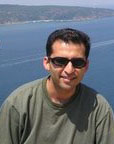
Salman Hameed is Assistant Professor of Integrated Science & Humanities at Hampshire College and an astronomer at Five College Astronomy Department. His science and religion research focuses on understanding modern creation movements in the Islamic world, reconciliation efforts over sacred objects and places of astronomical importance (such as Mauna Kea in Hawaii), and creationism in UFO religions. He currently teaches inter-disciplinary classes on history and philosophy of science and religion, science in the Islamic world, and science and public policy.
Dr. Hameed’s lecture was givin on Tuesday, September 30, at 7:00 p.m. in the Skutt Student Center Room 105. The lecture was co-sponsored by the Henry W. Casper Professorship in History.
April 17-19, 2008
Faithful Citizenship: Principles and Strategies to Serve the Common Good
The Kripke Center, in cooperation with the Graff Faculty Chair of Catholic Theology, sponsored a symposium on the Catholic Interface of Church and State. Nine nationally recognized scholars delivered addresses on prominent issues in Church – State relations, and local scholars responded. The papers will be published in the Supplement Series of the Journal of Religion & Society.
The symposium began on Thursday evening, April 17, and ran through noon on Saturday, April 19. All events were held in the Skutt Student Center.
April 7, 2008
Scriptural and Liturgical Responses to the Holocaust
Steven Kepnes addressed theological responses to the Holocaust as part of the Kripke Center’s Holocaust Studies Lectures.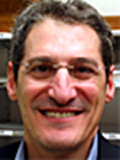
Dr. Steven Kepnes is the William Finard Chair of Jewish Studies and chair of the religion department at Colgate University. He is the author of Liturgical Reasoning (2007), Scripture, Reason, and the Islam-West Encounter (Edited with Basit Koshul; 2007), Reason after Revelation: Dialogues in Postmodern Jewish Philosophy (with Peter Ochs and Robert Gibbs; 1998 ), Interpreting Judaism in a Postmodern Age (1996), and The Text as Thou: Martin Buber’s Hermeneutics (1992). He is currently working on a book on The Signs of Prophecy.
The lecture was given on Monday, April 7, at 7:00 p.m. in the Skutt Student Center, Ballroom East.
March 13, 2008
The Religious Lives of Muslim Women
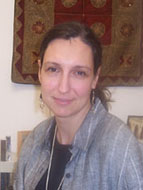 Maria Massi Dakake, of George Mason University, delivered the sixth annual Women and Religion lecture.
Maria Massi Dakake, of George Mason University, delivered the sixth annual Women and Religion lecture.
Dr. Dakake holds a Ph.D. (2000) in Near Eastern Studies from Princeton University. She is currently Associate Professor of Religious Studies at George Mason University, where she teaches courses on Islam and other Near Eastern religious traditions, as well as courses on women in religion, and is one of the founding faculty members of the Islamic Studies Program. Her research interests lie in the fields of Islamic theology, philosophy, and mysticism, with a particular interest in Shi‘ite and Sufi traditions and in women’s issues. She has just published a book on the intellectual formation of the early Shi‘ite community, entitled, The Charismatic Community: Shi‘ite Identity in Early Islam (2007). She is currently part of an editorial team compiling a Study Qur’an, including extensive commentary on the text, and is working individually on a book about the lives and spiritual devotions of women mystics in Islam.
Her lecture was given Thursday, March 13 at 7:00 p.m. in the Hixson-Lied Science Building, room G4.
March 10, 2008
Post-Holocaust Thoughts on God, Beauty, and Rotten Timber (with a Concluding Talmudic Postscript)
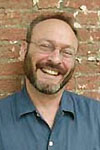 Zachary Braiterman addressed the theological consequences of the Holocaust as part of the Kripke Center’s Holocaust Studies Lectures.
Zachary Braiterman addressed the theological consequences of the Holocaust as part of the Kripke Center’s Holocaust Studies Lectures.
Zachary Braiterman is Associate Professor of Religion in the Department of Religion at Syracuse University, where he works in modern Jewish thought and culture. Braiterman is the author of The Shape of Revelation: Aesthetics and Modern Jewish Thought (2007), as well as (God) After Auschwitz: Tradition and Change in Post-Holocaust Jewish Thought (1998). His research and teaching interests reflect upon the impact of modernity upon the “art” of religion, namely philosophical and theological expression, ritual practice, text-interpretation, and community life.
The lecture was given on Monday, March 10, at 7:00 p.m. in the Skutt Student Center, Ballroom East.
February 6, 2008
Jews and Christians After Auschwitz: Modernity, Memory and Reconciliation
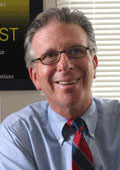 |
 |
Rabbi Michael Signer and Dr. J. Matthew Ashley dialogued over Jewish and Christian responses to the Holocaust at part of the Kripke Center’s Holocaust Studies Lectures.
Rabbi Signer is the Abrams Professor in the Department of Theology and a Senior Fellow of the Medieval Institute at Notre Dame University. He is Director of the Notre Dame Holocaust Project – an interdisciplinary faculty group that designs educational opportunities for students to engage in the study of the Shoah. Since 1998 he has been co-chair of the Joint Commission on Interreligious Affairs of the Reform movement. He is the author and editor of five books on topics that range from Medieval Latin biblical commentaries to contemporary Jewish-Christian relations such as Humanity at the Limit: The Impact of the Holocaust Experience on Jews and Christians; Memory and History in Judaism and Christianity; Jews and Christians in Twelfth-Century Europe. He is one of the four authors of Daberu Emet: A Jewish Statement on Christians and Christianity.
Dr. Ashlely is Associate Professor of Theology and Director of Graduate Studies at Notre Dame University. His scholarly interests include political and liberation theology, Christian spirituality, and the dialogue between theology and science. He is the author of Interruptions: Mysticism, Politics and Theology in the Work of Johann Baptist Metz.
Their joint lecture and dialogue took place on Wednesday, February 6 at 7:00 p.m. in the Skutt Student Center, Ballroom West.
January 31, 2008
The “New Atheism” and the Scientific-Naturalist Tradition
Dr. Nancey Murphy gave a lecture addressing the popular “new athesism.”
Nancey Murphy is Professor of Christian Philosophy at Fuller Theological Seminary, Pasadena, CA. She received the B.A. from Creighton University (philosophy and psychology) in 1973, the Ph.D. from U.C. Berkeley (philosophy of science) in 1980, and the Th.D. from the Graduate Theological Union (theology) in 1987.
Her first book, Theology in the Age of Scientific Reasoning (1990) won the American Academy of Religion award for excellence. She is author of eight other books including On the Moral Nature of the Universe: Theology, Cosmology, and Ethics (1996; co-authored with George Ellis), and Did My Neurons Make Me Do It? Philosophical and Neurobiological Perspectives on Moral Responsibility and Free Will (Oxford University, 2007; co-authored with Warren Brown).
Her research interests focus on the role of modern and postmodern philosophy in shaping Christian theology; on relations between theology and science; and relations between neuroscience and philosophy of mind.
Dr. Murphy’s lecture was given Thursday, January 31, at 7:00 p.m. in the Skutt Student Center, room 104.
January 14
Paul on Judaism . . . and Other Religious Traditions
Dr. Pamela Eisenbaum will address St. Paul’s understanding of Judaism, and then extrapolate from this how Paul would have viewed other religious traditions.
Dr. Eisenbaum is a Professor of Biblical Studies and Christian Origins at Iliff School of Theology in Denver. She has published widely on Paul, including a forthcoming book from HarperCollins. As a Jewish New Testament scholar, she has contributed to understanding early Jewish-Christian relations.
Dr. Eisenbaum’s lecture will be given Monday, January 14, at 7:00 p.m. in the Skutt Student Center, room 104.
October 28-29, 2007
“The Mountains Shall Drip Wine”: Jews and the Environment
The Twentieth Annual Klutznick-Harris Symposium explored the role of the environment in the Jewish tradition. The two day symposium, drawing speakers from around the United States and Israel was held at the Jewish Community Center on Sunday, October 28. On Monday, October 29, the sessions were held at Creighton University in the Skutt Student Center Ballroom.
For further information, see the website of the Klutznick Chair in Jewish Civilization.
The proceedings of the symposium will be published in the Studies in Jewish Civilization series.
October 25-26, 2007
Religion and the Environment
The Kripke Center symposium brought together twelve scholars to address in diverse ways the complex relationship between religion and the environment, including such issues as, the ways in which religion has shaped human attitudes and treatment of the environment, the role of the environment in religious traditions, and the hope religion offers for renewal of the environment.
The papers will be published as a supplement of the Journal of Religion & Society
All talks were given in the Skutt Student Center, room 105.
October 4, 2007
The Undecidability of Pascal’s Wager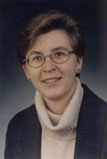
Dr. Marion Ledwig, Visiting Assistant Professor of Philosophy at the University of Nevada, Las Vegas, spoke on Thursday, October 4 at 4:00 p.m. in the Union Pacific Room of Reinert Alumni Library. She is the author of numerous books and articles, including Common Sense: its History, Method, and Applicability (2007), Emotions: their Rationality and Consistency (2006), and Reid’s Philosophy of Psychology (2005).
This lecture was free and open to the public.
April 3, 2007
Islam and Christianity: One Divine and Human Language or Many Human Languages
Professor Therese Anne Druart delivered the spring Philosophy-Theology lecture on the language of God in Christian and Islamic thought.
Dr. Druart is Professor of Philosophy at Catholic University of America and director of its Center for Medieval and Byzantine Studies. She has written extensively on Medieval Islamic philosophy and thought.
Professor Druart’s lecture was given Tuesday evening, April 3, at 7:00 p.m. in the Skutt Student Center room 105.
March 27, 2007
The Old Testament: Reading the Text of Our Lives
Professor Alice Laffey gave a feminist and liberationist reading of the Old Testament in the fifth annual Women and Religion Lecture.
Dr. Laffey is an Associate Professor of Religious Studies at the College of the Holy Cross. The thrust of her scholarship focuses on bringing ancient texts into the contemporary world through a liberation perspective. She is the author of several volumes reflecting this focus, including Introduction to the Old Testament: A Feminist Perspective, Appreciating God's Creation through Scripture, and The Pentateuch: A Liberation Critical Reading.
Professor Laffey’s lecture was given Tuesday evening, March 27, at 7:00 p.m. in the Skutt Student Center Ballroom. The lecture was co-sponsored by the Women and Gender Studies Program.
March 22, 2007
Close Encounters: Jews, Germans, and Allies in Occupied Germany 1945-1949
Professor Atina Grossmann spoke on the Holocaust as part of the Kripke Center’s Holocaust Studies Lectures.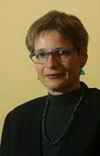
Professor Grossmann teaches Modern European and German history, and women’s and gender studies at Copper Union. Her publications include Reforming Sex: The German Movement for Birth Control and Abortion Reform 1920-1950 (1995), co-edited collections When Biology Became Destiny: Women in Weimar and Nazi Germany (1984), and Crimes of War: Guilt and Denial in the 20th Century (2002), and numerous articles on gender, modernity, war and genocide, and German and Jewish memory in twentieth century Germany. Her new book on Victims, Victors, and Survivors: Germans, Allies and Jews in Occupied Germany 1945-1949 is being published by Princeton University Press.
Professor Grossmann’s lecture was given Thursday evening, March 22, at 7:00 p.m. in the Skutt Student Center Ballroom.
March 15, 2007
Thinking Through the Rethinking of “Missions History”
Dr. Michael McNally presented a lecture addressing the history of Native American encounters with missionaries.
Dr. McNally is Associate Professor of Religion at Carleton College. A 1985 graduate of Carleton College, he received a Ph.D. in the history of religion in America at Harvard University. He is author of Ojibwe Singers: Hymns, Grief, and a Native Culture in Motion (Oxford, 2000), editor of Arts of Tradition: Sacred Song, Dance, and Narrative among Michigan’s Anishinaabeg 1940-1955 (Michigan State University Press, 2007), and currently at work on a book about the authority and significance of age and eldership among the Ojibwe.
Dr. McNally’s lecture was given Thursday evening, March 15, at 7:00 p.m. in the Skutt Student Center room 105.
February 8, 2007
From Berlin to Babi Yar: The Nazi War Against the Jews in Ukraine
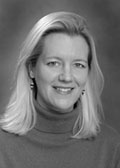 Dr. Wendy Lower spoke on the Holocaust as part of the Kripke Center’s Holocaust Studies Lectures.
Dr. Wendy Lower spoke on the Holocaust as part of the Kripke Center’s Holocaust Studies Lectures.
Dr. Wendy Lower is assistant professor of history at Towson University, MD. Formerly the Director of Visiting Scholars Programs, research fellow and historical consultant for exhibitions at the U.S. Holocaust Memorial Museum, Dr. Lower published the book, Nazi Empire Building and the Holocaust in Ukraine (UNC Press, 2005). She serves on the international advisory board for the Journal of Genocide Research and will be joining the history faculty at the University of Munich, Germany as a research and teaching fellow for the next two years.
Dr. Lower’s lecture was given Thursday evening, February 8, at 7:00 p.m. in the Skutt Student Center Ballroom East.
November 7, 2006
Imitating God and not Pharoah: A Rabbinic Reading of Justice and Redemption in the City
Dr. Aryeh Cohen, an expert on the Talmud, addressed social justice in the Jewish tradition.
Dr. Aryeh Cohen is Associate Professor of Rabbinic Literature at the University of Judaism. He has taught at Hebew Union College/Jewish Institute of Religion, the Reconstructionist Rabbinical College and Brandeis University. Dr. Cohen is the author of Rereading Talmud: Gender, Law and the Poetics of Sugyot (Scholars Press, 1998) and co-editor of Beginning/Again: Towards a Hermeneutics of Jewish Texts (Seven Bridges Press, 2002). He is also a member of the Sh’ma advisory board. Cohen is a popular lecturer on Talmud, on politics and on the contemporary Jewish scene. His writing on these topics and others has been published in numerous journals.
The lecture was given Tuesday, November 7 at 7:00 p.m. in the Skutt Student Center, room 105.
November 6, 2006
Peacemaking in the Age of Terrorism
The Kripke Center sponsored a dialogue with Christian Peacemaker Teams founder Gene Stoltzfus on this important topic. The dialogue was held on Monday, November 6 at 4:00 p.m. in the west ballroom of the Skutt Student Center.
This dialogue was co-sponsored by the Justice & Peace Studies Program and the Kenefick Chair in the Humanities.
October 29-30, 2006
Jewish Music and Musicians Throughout the Ages
The Nineteenth Annual Klutznick-Harris Symposium explored music in the Jewish tradition. The two day symposium, drawing speakers from around the United States, Israel, and Germany was held at the Jewish Community Center on Sunday, October 29. On Monday, October 30, the sessions were held at Creighton University in the Skutt Student Center Ballroom.
For further information, see the website of the Klutznick Chair in Jewish Civilization.
The proceedings of the symposium will be published in the Studies in Jewish Civilization series.
October 9, 2006
Newman and the Restoration of the Interpersonal in Higher Education
Fr. Michael Buckley presented the fall Philosophy - Theology Lecture.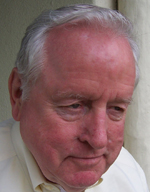
Michael J. Buckley, S.J. is the Augustine Cardinal Bea, S.J. Professor in the Department of Religious Studies at Santa Clara University, and for the past several years has been serving as the University Professor of Theology at Boston College. He is author of numerous articles and several books including: At the Origins of Modern Atheism and The Catholic University as Promise and Project: Reflections in a Jesuit Idiom. He is past president of the Catholic Theological Society of America, and a recipient of the John Courtney Murray Award for excellence in theology. He serves on the Board of Visitors of Harvard Divinity School and is a Fellow of Clare College at Cambridge University. He received his B.A and M.A from Gonzaga University, a Ph.L, and S.T.L. from Pontifical Faculty of Alma, an S.T.M. from the University of Santa Clara, and a Ph.D. from University of Chicago.
The lecture was given on Monday, October 9 at 7:00 p.m. in room G4 of the Hixson-Lied Science building.
September 10, 2006
Interfaith Dialogue in the Shadow of 9/11
Why should Jews, Christians, and Muslims engage in interfaith dialogue? This conference, with internationally recognized speakers, addressed this question and discussed what Jews, Christians, and Muslims can learn from each other. The speakers included:
Dr. Sulayman Nyang, Howard University (Muslim)
Dr. Philip Cunningham, Boston College (Christian)
Rabbi Gary Bretton-Granatoor, Anti-Defamation League (Jewish)
Rev. Dirk Ficca, Council for a Parliament of the World’s Religions
The participants in the conference also had the opportunity to dialogue with participants of other faith traditions.
The conference was held Sunday, September 10, from 1:00 - 6:30 in the Skutt Student Center Ballroom. Pre-Registration and a small fee was required.
April 24 and May 10, 2006
The Newly Discovered Gospel of Judas: A Revolutionary Find - But Does it Revolutionize Theology?
In early April 2006, the National Geographic Society announced the discovery of a long-lost Gospel of Judas. The discovery has been surrounded by considerable fanfare. Fr. William Harmless, SJ, and Dr. John O’Keefe offered a forum that cut through the media hype and the hoopla and took a good clear look at the text itself, not only the fascinating story of its discovery and reconstruction, but also its Gnostic origins, contents, and context.
Fr. William Harmless, SJ, and Dr. John O’Keefe are specialists in the history and theology of early Christianity. Fr. Harmless is the author of Desert Christians: An Introduction to the Literature of Early Monasticism (Oxford, 2004). Dr. John O’Keefe is the chair of Creighton’s Department of Theology and the author of Sanctified Vision: An Introduction to Early Christian Interpretation of the Bible (Johns Hopkins, 2005).
The forum was Monday, April 24, from 3:00 - 4:00 p.m. in the Humanities Center 306, and then later on Wednesday, May 10, from 12:00 - 1:00 p.m. in the Skutt Student Center room 104.
April 10, 2006
The New Religious Pluralism: Implications for American Democracy
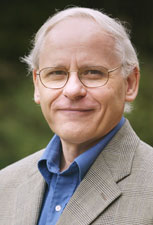 Robert Wuthnow presented a lecture building on his recent book, America and the Challenges of Religious Diversity (2005).
Robert Wuthnow presented a lecture building on his recent book, America and the Challenges of Religious Diversity (2005).
Robert Wuthnow is Andlinger Professor of Sociology and Director of the Center for the Study of Religion at Princeton University. In addition to his teaching, he has served as director of Princeton’s Program in Science in Human Affairs, was a founding member of the executive committee of the University Center for Human Values, was founder and director of the Center for the Study of American Religion, and since 1999 has served as founding director of the Center for the Study of Religion.
Professor Wuthnow is the author of more than twenty books, including Acts of Compassion, which received a Pulitzer Prize nomination in 1991, and Loose Connections: Joining Together in America’s Fragmented Communities, which received the Distinguished Book Prize from the Association for Research on Nonprofit and Voluntary Associations in 1998. His recent books include Growing Up Religious: Christians and Jews and Their Journeys of Faith, published in 1999, All In Sync: How Music and Art Are Revitalizing American Religion, published in 2003; and America and the Challenges of Religious Diversity, published in 2005. He has received numerous grants and scholarly awards, including the Martin Marty Award for Religion and Public Life from the American Academy of Religion, a Guggenheim Fellowship for his work on religion and diversity, and the 2003 Graduate Mentoring Award in Social Science from Princeton University.
The lecture was given Monday, April 10 at 7:00 p.m. in the Skutt Student Center Ballroom.
April 6, 2006
Becoming: Introducing Apache Girls to the World of Spiritual and Cultural Values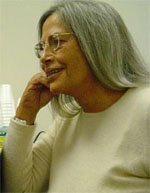
Dr. Inés Maria Talamantez presented the annual Women in Religion Lecture.
Dr. Talamantez is an Associate Professor for the Departments of Religious Studies and Chicana/o Studies at the University of California, Santa Barbara. She’s also an Affiliate Faculty for the Program in Women’s Studies and Latin American and Iberian Studies and Senior Fellow in the Center for the Study of World Religions, Harvard University. She is the founder and director of Graduate Studies in Native American Religious Traditions at UCSB.
The lecture was given on Thursday, April 6, at 7:00 p.m. in Skutt Student Center Ballroom East.
April 5, 2006
Religious Pluralism and the Buridan’s Ass Paradox
Jonathan Kvanvig presented the spring Philosophy - Theology Lecture on the philosophical problems of religious pluralism.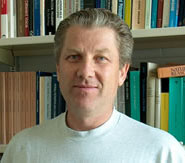
Dr. Kvanvig is Professor of Philosophy and Chair of the Philosophy Department at the University of Missouri. He has previously held positions at Texas A&M University and the University of Notre Dame. His published work covers a wide range of areas of philosophy including metaphysics and epistemology, philosophy of religion, philosophy of language, and philosophy of logic. His books include The Possibility of an All-Knowing God (Macmillan, 1986), The Intellectual Virtues and the Life of the Mind (Rowman & Littlefield, 1992), The Problem of Hell (Oxford, 1993), and The Value of Knowledge and the Pursuit of Understanding (Cambridge, 2003). His most recent work, The Knowability Paradox, has just been released by Oxford this February.
The lecture was given Wednesday, April 5, at 7:00 p.m. in room G4 of the Hixson-Lied Science Building.
February 13, 2006
The Significance of the Dead Sea Scrolls for Judaism and Christianity
Dr. Adolfo Roitman, curator of the Shrine of the Book, the depository for the Dead Sea Scrolls, lectured on the significance of the scrolls for understanding the origins of Judaism and Christianity.
The lecture was given Monday, February 13, at 3:30 in the Skutt Student Center, room 105.
November 14, 2005
Religion and “Terrorism” in Context
The Kripke Center sponsored a symposium in which nationally recognized scholars addressed how religion has been used to support violence against others, both in the past and in the present. The symposium was held in the Skutt Student Center Ballroom from 9:00 a.m. to 5:00 p.m. It was free and open to the public.
Participants in the Symposium:
Yaakov Ariel (University of North Carolina, Chapel Hill). “Terror at the Holy of Holies?: Turn of the 21st Century Christians and Jewish Builders of the Temple.”
Raymond Bucko, S.J. (Creighton University). “Peter the Aleut: Sacred Icons and the Iconography of Violence.”
John Calvert (Creighton University). “‘The Striving Shaykh’: Abdullah Azzam and the Revival of Jihad.”
Faisal Devji (New School). “Landscapes of Jihad.”
Eileen Dugan (Creighton University). “Jerusalem in the Crusades: The Sacks of 1099 and 1187.”
Richard Hecht (University of California, Santa Barbara). “Writing Terror: The Representations and Interpretations of Terrorism in Eduardo Galeano, Cormac McCarthy, and William Vollmann.”
Tracy Leavelle (Creighton University). “Prophecy, Purity, and Progress: Religion and Violence in the Conquest of America.”
Vern Neufeld Redekop (Saint Paul University, Ottawa). “Religious Involvement in Mimetic Structures of Violence: The Case of Rwanda.”
James Tabor (University of North Carolina, Charlotte). “When and Why Violence? The Dynamics of Violence Potential Among Christian Apocalyptic Groups: Waco and other Case Studies.”
James Waller (Whitworth College). “Deliver Us From Evil: Genocide and the Christian World.”
November 7, 2005
Aquinas’ Aristotelian Image of God
Dr. John O'Callaghan discussed the Image of God in Aquinas for the Fall Philosophy-Theology Lecture.
John O’Callaghan received his Ph.D. in Philosophy at the University of Notre Dame in 1996. In 1998 he joined the faculty of Creighton University as an assistant professor. After three wonderful years, he left and joined the faculty of the University of Portland as an associate professor. In 2003 he returned to his alma mater, the University of Notre Dame, as an associate professor and the associate director of the Jacques Maritain Center. Among some of his articles are “Aquinas’ Rejection of Mind, Contra Kenny,” “Creation, Human Dignity, and the Virtues of Acknowledged Dependence.” He is also the editor of the volume Recovering Nature, as well as the author of Thomist Realism and the Linguistic Turn.
The lecture was given on Monday, November 7, at 7:00 p.m. in the Hixson Lied Science Building, Room G4.
November 4, 2005
When Taking Medication is a Sin: Religious Traditions and the Presence of Animal Products in Medications
Based in part on research funded by the Krikpe Center, several health care scholars and religious speakers gathered for a symposium addressing the problematic role of animal products in medications.
The symposium was held on Friday, November 4, from 8:30 to Noon in the Boys Town National Research Hospital Auditorium. The symposium was free and open to the public. The brochure for the symposium is linked here.
October 30, 2005
Community Conversation on Jewish-Catholic Relations in Omaha
A panel of Jewish and Catholic clergy and lay leaders examined the evolution of Jewish-Catholic relations since the Second Vatican Council and discussed the current state of Jewish-Catholic relations in Omaha.
The discussion was held on Sunday, October 30, from 2:00 - 4:00 p.m. at the Cathedral Cultural Center (3900 Webster St., behind St. Cecilia's Cathedral). The event was co-sponsored by the Anti-Defamation League and the Archdiocese of Omaha.
October 27, 2005
Intelligent Design, Evolution, and Science Classes
The Critical Issues Fora discussed the current controversy of whether intelligent design should be taught as an alternative to evolution in science classes. The forum was moderated by Julia Fleming, who was joined by:
Charles Austerberry (Biology Department)
Gene Selk (Philosophy Department)
Ronald Simkins (Theology Department
The forum was held Thursday, October 27, from 3:30-5:00 p.m. in room G4 of the Hixson Lied Science Building.
October 11, 2005
Memory and Imagination in Ignatian Spirituality
David Fleming, S.J., a nationally known writer and speaker, spoke for the Catholic Imagination Project on Tuesday, October 11, in St. John’s Church. A pre-talk reception was held in lower St. John’s Church from 4:15-5:00 p.m. This event was co-sponsored by the Collaborative Ministry Office.
October 10, 2005
Fighting Words: The Role of Religion in Violence
Dr. Hector Avalos lectured on the topic of his new controversial book, Fighting Words: The Origins of Religious Violence (Prometheus, 2005).
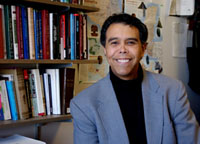 Dr. Avalos is an Associate Professor of Religious Studies at Iowa State University, where he was named Professor of the Year in 1996 and a 2003-04 Master Teacher. He also is the founder and Director of the U.S. Latino Studies Program at ISU, and the Executive Director of the Committee for the Scientific Examination of Religion, a part of the Council for Secular Humanism based in Amherst, New York.
Dr. Avalos is an Associate Professor of Religious Studies at Iowa State University, where he was named Professor of the Year in 1996 and a 2003-04 Master Teacher. He also is the founder and Director of the U.S. Latino Studies Program at ISU, and the Executive Director of the Committee for the Scientific Examination of Religion, a part of the Council for Secular Humanism based in Amherst, New York.
Dr. Avalos earned his Ph.D. at Harvard University in Near Eastern Languages and Civilizations. He is the author of five books and numerous scholarly articles on ancient health care, biblical studies, and Latina/o studies.
The lecture was given Monday, October 10 at 3:30 p.m. in the Skutt Student Center, room 105.
September 28, 2005
Violence in India: Religion as Cause and Remedy
Fr. Cedric Prakash, S.J. addressed the role of religion in the recent violence between Muslims and Hindus in the Gujarat province of India.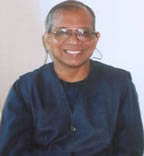
Fr. Prakash is a jesuit priest based in Gujarat, India. He is the official spokesperson of the Gujarat United Christian Forum for Human Rights, an ecumenical body that includes the Catholics and most Protestant groups in the state. He has been involved in providing relief to the victims of the recent anti-Muslim pogroms in Gujarat and in exposing and protesting against the role of the state and Hindutva groups in the violence. Earlier, he played a major role in galvanizing public opinion about the persecution of Christians in the state. He was also active in Delhi assisting the victims of the anti-Sikh riots of 1984. He is the recipient of India's highest Human Rights award, The Kabir Puraskar - an award by the President of India in 1995 - for the promotion of Communal Peace and Harmony.
Fr. Prakash is the director of "Prashant," a center for human rights, justice and peace, and is also the coordinator of the Province Office for Integral Social Development, an organization dedicated to coordinating developmental, justice and peace works of the Society of Jesus in Gujarat, India
The lecture was held on Wednesday, September 28, at 3:30 in the Skutt Student Center, room 105.
September 29, 2005
The Vocation of Peacemaking in a World of Violence
Fr. Prakash joined by Dr. James Alison for a panel discussion addressing the role of religion in a violent world.
The panel discussion was held on Thursday, September 29, from 4:30-6:00 p.m. in the Skutt Student Center Ballroom. This event was co-sponsored by Cardoner at Creighton.
September 18-19, 2005
Love - Ideal and Real - in the Jewish Tradition from the Hebrew Bible to Modern Times
The Eighteenth Annual Klutznick-Harris Symposium explored love in the Jewish tradition. The two day symposium, drawing speakers from around the United States and Israel was held at the Jewish Community Center on Sunday, September 18. On Monday, September 19, the sessions were held at Creighton University in the Student Center Ballroom.
For further information, see the website of the Klutznick Chair in Jewish Civilization.
The proceedings of the symposium will be published in the Studies in Jewish Civilization series.
April 27, 2005
Life Sustaining Technologies: Medical and Ethical Reflections on the Terri Schiavo Case
The Critical Issues Forum considered the medical and ethical issues raised by the recent legal controversy involving Terri Schiavo. The forum was moderated by Julia Flemming of the Theology Department. Joining Dr. Flemming will be:
Todd Salzman, Theology Department
Jos Welie, Center for Health Policy and Ethics
The forum was held on Wednesday, April 27, at 3:30-5:00 p.m. in the Skutt Student Center, room 104.
April 14, 2005
Religious Experience, Theological Argument, and the Relevance of Rhetoric
Professor William Wainwright addressed the contribution that analytic philosophy can make to theology.
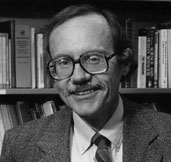 William Wainwright is the Distinguished Professor Emertius of Philosophy at the University of Wisconsin-Milwaukee. He is the author of numerous books, including Reason and the Heart (Cornell University Press, 1995), Philosophy of Religion (Wadsworth Publishers, 1988; second edition, 1998) and Religion and Morality (Ashgate Publishing, forthcoming in 2005). He is the editor of God, Philosophy and Academic Culture (Scholar's Press, 1996), The Oxford Handbook for Philosophy of Religion (Oxford University Press, 2004), and Faith and Philosophy, the premier journal of the philosophy of religion. His current research is on the relationship between ethics and religion and the philosophical theology of Jonathan Edwards.
William Wainwright is the Distinguished Professor Emertius of Philosophy at the University of Wisconsin-Milwaukee. He is the author of numerous books, including Reason and the Heart (Cornell University Press, 1995), Philosophy of Religion (Wadsworth Publishers, 1988; second edition, 1998) and Religion and Morality (Ashgate Publishing, forthcoming in 2005). He is the editor of God, Philosophy and Academic Culture (Scholar's Press, 1996), The Oxford Handbook for Philosophy of Religion (Oxford University Press, 2004), and Faith and Philosophy, the premier journal of the philosophy of religion. His current research is on the relationship between ethics and religion and the philosophical theology of Jonathan Edwards.
The lecture, part of the Philosophy-Theology Lecture Series, was given on Thursday, April 14, at 7:00 p.m. in the Skutt Student Center, room 104.
April 12, 2005
The Passion of Women and the Passion of Christ
The story of Christ's Passion is a powerful one that helps Christians make meaning of suffering and death. But it has also been told in ways that feed cycles of victimization of abused persons, particularly women, who accept any kind of suffering as their way of "carrying the cross" in the footsteps of Jesus. Still, the Passion and Resurrection narratives can also help to galvanize communities of believers toward transformative change. The lecture by Professor Barbara Reid focused on the Johannine Jesus, who goes to calamity's depths for his friends, as one image that offers liberative possibilities.
Barbara E. Reid, O.P. is a Grand Rapids Dominican Sister. She is Professor of New Testament at Catholic Theological Union in Chicago. She is the author of Parables for Preachers (3 volumes; The Liturgical Press, 1999, 2000, 2001), Choosing the Better Part? Women in the Gospel of Luke (The Liturgical Press, 1996), and A Retreat With St. Luke (St. Anthony Messenger Press, 2000). Her current research focuses on the Passion and Resurrection Narratives, with a view toward how these narratives can help Christians stop cycles of violence and victimization, particularly toward women. This project incorporates interviews with women from México, Bolivia, and Perú.
The lecture, part of the Women and Religion Lecture Series, was given on Tuesday, April 12, at 7:00 in the Skutt Student Center Ballroom.
April 4, 2005
St. Augustine in Africa: A Critical Review
 J. Patout Burns, the Edward A. Malloy Professor of Catholic Studies at Vanderbilt University, exploreed Augustine's use of figurative language for the Catholic Imagination Project.
J. Patout Burns, the Edward A. Malloy Professor of Catholic Studies at Vanderbilt University, exploreed Augustine's use of figurative language for the Catholic Imagination Project.
The author of numerous books and academic papers, Professor Burns is an expert on Christianity in Roman Africa. He is co-editor of the Journal of Early Christian Studies.
The lecture was given on Monday, April 4, at 3:30 p.m. in the Lied Art Gallery. A light reception followed the lecture.
April 3, 2005
Seminar in Art and Architecture in Christian North Africa
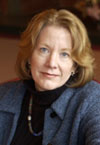 Robin Margaret Jensen, the Luce Chancellor's Professor of the History of Christian Worship and Art at Vanderbilt University, addressed how the material evidence (archaeology and art history) inform work on the history and practice of Christianity in North Africa.
Robin Margaret Jensen, the Luce Chancellor's Professor of the History of Christian Worship and Art at Vanderbilt University, addressed how the material evidence (archaeology and art history) inform work on the history and practice of Christianity in North Africa.
Professor Jensen is the author of Understanding Early Christian Art (Routledge, 2000), and most recently, Face to Face: The Portrait of the Divine in Early Christianity (Fortress, 2005). Her current projects include a study of the architectural space and iconography of early Christian baptism and the practice of Christianity in Roman North Africa.
The seminar was given on Sunday, April 3, at 3:30 p.m. in the Lied Educational Center for the Arts, room 104. Her seminar was supported by the Richard and Mary McCormick Endowment Fund for the Fine and Performing Arts.
March 21, 2005
The Holocaust and the Trajectory of the Twentieth Century
Dr. Moishe Postone presented a lecture arguing that Nazi anti-Semitism was a form of anti-capitalism.
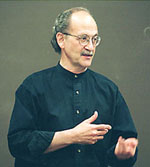 Dr. Postone is a professor of modern European history at the University of Chicago. He sits on the Committee on Jewish Studies. He has written Time, Labor, and Social Domination: A Reinterpretation of Marx's Critical Theory (1993), and numerous articles on critical theory, anti-Semitism and National Socialism, and postwar Germany. His recent book, edited with Eric Santner, is entitled, Catastrophe and Meaning: The Holocaust and the Twentieth Century.
Dr. Postone is a professor of modern European history at the University of Chicago. He sits on the Committee on Jewish Studies. He has written Time, Labor, and Social Domination: A Reinterpretation of Marx's Critical Theory (1993), and numerous articles on critical theory, anti-Semitism and National Socialism, and postwar Germany. His recent book, edited with Eric Santner, is entitled, Catastrophe and Meaning: The Holocaust and the Twentieth Century.
The lecture was given on Monday, March 21, at 7:00 p.m. in the Skutt Student Center, room 105.
February 14, 2005
Los rastros de la memoria / Traces of Memory
Pia Barros delivered a lecture on the relationship between the Catholic Church in Chile and the Pinochet dictatorship.
Ms. Barros is a short story writer from Chile and one of the most important intellectuals from that country. She spent the entirety of the Pinochet dictatorship writing clandestinely, and is now world-renowned for the narratives she wrote (and distributed) against the dictatorship, even under the sharp scrutiny of censors, through underground channels. During the dictatorship, she founded of a series of writers' workshops, opened the underground feminist press, Ergo Sum, and led grassroots political and artistic movements to reestablish a democratic government. After Pinochet's official ouster in 1990, she continued her leadership role as a public artist, television personality, publisher, professor, writer and international spokeswoman for her country.
The lecture was presented on February 14 at 4:30 p.m. in the Skutt Student Center, room 104. The lecture was given in Spanish with a simultaneous translation in English.
January 23, 2005
Successes and Challenges of Jewish-Christian Relations: Forty Years after Nostra Aetate
Fr. John T. Pawlikowski and Rabbi Leon Klenicki spoke on the occasion of the dedication of the Kripke Center and addressed the significance of Nostra Aetate for Jewish-Christian relations.
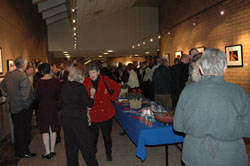 |
Reception after the dedication of the Kripke Center |
Fr. John T. Pawlikowski, a priest of the Servite Order, is the author or editor of more than fifteen books. Father Pawlikowski has participated in worldwide interfaith activities at the highest level. Among his honors has been service on the US Holocaust Memorial Council, membership on a number of Vatican delegations related to Jewish-Catholic dialogue, and top leadership posts in the International Council of Christians and Jews.
Rabbi Leon Klenicki, is widely known as the former interfaith affairs director of ADL. A pioneer in Catholic Jewish relations, Rabbi Klenicki was one of several major leaders asked to implement the vision of Vatican II as it related to improved relations between Catholics and Jews. A native of Argentina, Rabbi Klenicki has written or authored numerous works, including a Passover Haggadah for use in interfaith services.
The lectures was given in the Theatre of the Jewish Community Center at 7:00 p.m. on Sunday, January 23.
January 24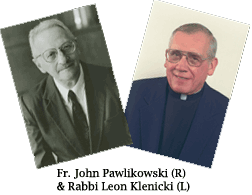 , 2005
, 2005
Seminar in Jewish-Christian Relations
Fr. John Pawlikowski and Rabbi Leon Klenicki conducted an academic seminar on issues in Jewish-Christian relations for faculty and interested laity.
The seminar took place on Monday, January 24, from 10:00 a.m. to 1:00 p.m. in the Skutt Student Center, room 105.
November 11, 2004
Is Curiosity a Vice?
Prof. Paul J. Griffiths addressed the question of whether curiosity is a vice as part of the Philosophy - Theology Lecture Series.
Paul J. Griffiths has held the Schmitt Chair of Catholic Studies at the University of Illinois in Chicago since 2000. Before that, he taught at the University of Notre Dame and the University of Chicago's Divinity School. He has published on Indian Buddhist thought, Augustine and early Latin Christianity, and various topics in philosophical theology. His most recent book is Lying: An Augustinian Theology of Duplicity (Brazos, 2004).
The lecture was given on Tuesday, November 11 at 7:00 pm. in the Reinert Alumni Library, room LL02 (near the Union Pacific Room). The lecture was co-sponsored by the Philosophy and Theology Departments of Creighton University.
November 1, 2004
What are we learning from Iraq?
The Critical Issues Forum hosted a light lunch and teach-in on what we are learning form the current war and ongoing conflict in Iraq. Jeanne Schuler, of the Philosophy Department, moderated a panel consisting of:
Roger Bergman, Justice and Peace Studies
John Calvert, History Department
Mike Kelly, Law School
The forum took place on Monday, November 1, at 12:30 in the Skutt Student Center, room 104. The doors opened at 12:15 for lunch. The forum was free and open to the public.
October 24-25, 2004
350 Years of American Judaism in Popular Culture
The Seventeenth Annual Klutznick-Harris Symposium explored American Judaism in popular culture. The two day symposium, drawing speakers from around the United States were held at the University of Nebraska-Lincoln on Sunday, October 24. A keynote address was given at the Jewish Community Center on Sunday evening. On Monday, October 25, the sessions were held at Creighton University in the Student Center Ballroom.
For further information, see the website of the Klutznick Chair in Jewish Civilization.
The proceedings of the symposium will be published in the Studies in Jewish Civilization series.
October 4, 2004
Ezekiel Saw the Wheel: The Black Imagination and the Formation of the Self
Fr. Joseph Brown presented a public lecture as part of the Catholic Imagination Project.
Poet and preacher, Father Brown is professor and director, Black American Studies Program, University of Southern Illinois at Carbondale.
The lecture was given in the main theatre of Lied Education Center for the Arts, Creighton Univesity, at 3:30 pm.
September 2, 2004
A Church Adrift? The Crisis of Roman Catholicism in the United States
Dr. Peter Steinfels presented a public lecture on the state of the Roman Catholic Church in the United States.
Dr. Steinfels is the author most recently of A People Adrift: The Crisis of the Roman Catholic Church in America, published in 2003 by Simon & Schuster. From 1988 to 1997 he was the senior religion correspondent of The New York Times, where he continues to write "Beliefs," a biweekly column on religion and ethics.
Dr. Steinfels earned a Ph.D. in European history at Columbia University. He has been a visiting professor of history (1997-2001) at Georgetown University and of American studies (1994-95) at the University of Notre Dame. He co-directed a major three-year research project on American Catholics in the Public Square, funded by the Pew Charitable Trusts.
Dr. Steinfels he has served as an editor of Commonweal magazine, the independent journal published by Catholic lay people, and The Hastings Center Report, the leading journal of medical and scientific ethics. In 2003 he and his wife (Margaret O’Brien Steinfels, long-time editor of Commonweal) were the recipients of the Laetare Medal, the University of Notre Dame's highest award for service to the church and society.
The lecture was given on Thursday, September 2 at 5:30 pm in the Skutt Student Center, room 104.
April 15, 2004
Abraham and the Seeds of Patriarchy
In Genesis 22, where Abraham is presented as a model of faith, he is willing to sacrifice rather than protect his son, Isaac. His model of faith is at the foundation of the three monotheistic, Abrahamic religions. Prof. Carol L. Delaney in the Women and Religion Lecture Series questioned this model. She suggested that assumptions about gender and procreation underpin the story that symbolizes the establishment of a patriarchial theo-social order.
Prof. Delaney is a professor of anthopology at Stanford University. She has written several books including The Seed and the Soil: Gender and Cosmology in Turkish Village Society (U. California), and Abraham on Trial: The Social Legacy of Biblical Myth (Princeton).
The lecture was given on Thursday, April 15 at 7:00 pm. in lecture hall G4 of the Hixson-Lied Science Building. The lecture was co-sponsored by the Women's and Gender Studies Program.
March 30, 2004
Can God be Free?
God is necessarily perfect in power, knowledge, and goodness. How, then, can God be free not to create a good world, or free to create less than the best world? For his perfect nature necessitates his always doing what is best. Prof. William Rowe addressed the questions of whether God can be free as part of the Philosophy - Theology Lecture Series.
Prof. Rowe is a professor of philosophy at Purdue University. He has held numerous fellowships, and is the author of five books, including his recent, Can God Be Free? (Oxford, 2004).
The lecture was given on Tuesday, March 30 at 7:00 pm. in the Skutt Student Center, room 104. The lecture was co-sponsored by the Philosophy and Theology Departments of Creighton University.
March 24, 2004
Religious Faith and Political Activity: Reflections American and Catholic
The Intellectual Issues Forum addressed the role of religious faith in political activity. Issues that will be considered include 1) the Catholic Church's understanding of its adherents' participation in political life, 2) Church-State relations, and the Catholic approach to political activity, in light of recent work by
American Constitutional scholars, and 3) discussion of concrete public policy issues such as war and peace, economic policies, and family issues. Panelists for the forum include:
John W. Carlson, Department of Philosophy
Bette Novit Evans, Department of Political Science and International Relations
Todd Salzman, Department of Theology
The forum was held Wednesday, March 24 at 3:30 - 5:00 in the Skutt Student Center room 105. The forum is free and open to the public.
February 17, 2004
Should Hate Speech be Protected as Free Speech?
The Critical Issues Forum addressed the issue of whether hate speech should be protected as free speech. The forum was moderated by John Wingender, associate dean of the College of Business Administration. Panelists for the forum included:
Bette Novit Evans, Department of Political Science and International Relations
Bob Wolfson, director of the Plains States Regional Office of the Anti-Defamation League
Carol Zuegner, Department of Journalism and Mass Communication
The forum was held Tuesday, February 17 at 3:30 - 5:00 in the Union Pacific Room of the Reinert Alumni Library. The forum was free and open to the public.
January 29, 2004
Exploring Mel Gibson's The Passion of Christ
This symposium explored some of the issues surrounding Mel Gibson's soon to be released movie dramatizing the passion of Christ. The lectures and speakers were as follows:
"Is the New Testament Anti-Semitic?"
by Dennis Hamm, SJ, Creighton University
"Christ's Passion on Stage: The Traditional Melodrama of Deicide"
by Gordan Mork, Purdue University
"Christian Anti-Semitism: Past History, Present Challenges"
by John Pawlikowski, OSM, Catholic Theological Union
"Passion-ate Moments in the Jesus Film Genre"
by Adele Reinhartz,Wilfrid Laurier University
"Romans, Jews, and Greeks: The World of Jesus and the Disciples"
by Sidnie White Crawford, University of Nebraska-Lincoln
"The Execution of Jesus: A Historical Reconstruction"
by Philip Cunningham, Boston College
"Gibson's Passion: A Case Study in Media Manipulation"
by Mark Silk, Trinity College
"Sectarian Catholicism and Mel Gibson?"
by Michael Lawler, Creighton University
A Review of the The Passion of Christ
by Charles Jurgensmeier, SJ, Creighton University
All papers are published in the Journal of Religion & Society
Download the Viewer's Guide for the film.
The symposium was co-sponsored by the Journal of Religion and Film, Anti-Defamation League (Plains States Office), Klutznick Chair in Jewish Civilization, Journal of Religion & Society, Jewish Educational & Library Services (JELS), the Jesuit Community, and the Committee on Concerts, Lectures, and Films.
November 7, 2003
Divine Images: Cult Statues in the Ancient Greek World
Dr. Jennifer Larson presented a public lecture on origins and development of cult statues, their relationship to the Greek temple, and some of the methodological problems involved in the study of cult images.
Dr. Larson is an associate professor of classics at Kent State University. She is a dynamic teacher and accomplished scholar who is currently working on a book on ancient Greek cult statues, and what these art works can tell us about ancient religion. Her publications include Greek Nymphs: Myth, Cult, and Lore (Oxford University Press, 2001) and Greek Heroine Cults (Univ. of Wisconsin Press, 1995).
The lecture was given on Friday, November 7 at 4:00 p.m. in the Union Pacific Room. The lecture was co-sponsored by the Classical & Near Eastern Studies Department.
September 14-15, 2003
The Jews of Eastern Europe
The Sixteen Annual Klutznick-Harris Symposium explored the context of Jews iin Eastern Europe. The two day symposium, drawing speakers from around the United States, Great Britain, and Israel, was held at the Jewish Community Center on Sunday, September 14, and at Creighton University on Monday, September 15 in the Student Center Ballroom.
For further information, see the website of the Klutznick Chair in Jewish Civilization.
The proceedings of the symposium will be published in the Studies in Jewish Civilization series.
September 8, 2003
Knowing God Through Creation: Aquinas vs. Scotus
Fr. David Burrell, C.S.C. of Notre Dame presented a public lecture on "Knowing God Through Creation" as part of the Philosophy - Theology Lecture Series.
David Burrell, C.S.C. is currently Theodore Hesburgh Professor in Philosophy and Theology at the University of Notre Dame, and has been working since 1982 in comparative issues in philosophical theology in Judaism, Christianity, and Islam, as evidenced in Knowing the Unknowable God: Ibn-Sina, Maimonides, Aquinas (Notre Dame, 1986) and Freedom and Creation in Three Traditions (Notre Dame, 1993), Friendship and Ways to Truth (Notre Dame, 2000), and two translations of al-Ghazali: Al-Ghazali on the Ninety-Nine Beautiful Names of God (Cambridge: Islamic Texts Society,1993) and Al-Ghazali on Faith in Divine Unity and Trust in Divine Providence (Louisville: Fons Vitae, 2001). With Elena Malits he co-authored Original Peace (New York: Paulist, 1998). Earlier published writings include Analogy and Philosophical Language (1973), Exercises in Religious Understanding (1975), Aquinas: God and Action (1979), and an edition (with Bernard McGinn): God and Creation (1990).
The lecture was given at 7:00 p.m. in the Skutt Student Center room 105. The lecture was co-sponsored by the Philosophy and Theology Departments.
April 3, 2003
Misogynism, Anti-Judaism, and Repressed Sexuality: Reassessing Biblical Women
Our cultural legacies of sexism, Christian triumphalism, and body/soul dualism continue to influence biblical interpretation. Professor Amy-Jill Levine in the inaugural lecture of the Women and Religion Lectures challenged these influences and so their continuing effects through the introduction of the categories of gender, sexuality, and women's history into the discipline.
Professor Levine is the E. Rhodes and Leona B. Carpenter Professor of New Testament Studies and Director of the Carpenter Program in Religon, Gender, and Sexuality at Vanderbilt University Divinity School. She has published numerous works on Christian origins, Jewish-Christian relations, and sexuality, gender, and the Bible. She is currently the editor of The Feminist Companions to the New Testament and Early Christian Literature (Continuum/Sheffield Academic Press).
The lecture was given at 7:00 p.m. in lecture hall G4 of the New Science Building. The lecture was co-sponsored by the Women's and Gender Studies Program and the Klutznick Chair in Jewish Civilization.
February 24, 2003
War with Iraq?
The Critical Issues Forum considered the moral and legal impications of the possible war against Iraq.
Joining Roger Bergman, Moderator of the Critical Issues Fora and Director of the Justice and Peace Studies program, were:
Dr. Russell Reno, Ph.D.Theology Department
Fr. Dennis Hamm, S.J., Theology Department
Michael Kelly, J.D., Law School.
The forum was held Monday, February 24, from 3:30 - 5:00 in the Lecture Hall G4 in the New Science Building.
February 13, 2003
The Religious Uses of Modern Atheism
Professor Merold Westphal presented a public lecture on "The Religious Uses of Modern Atheism" as part of the Philosophy - Theology Lecture Series.
Merold Westphal is the Distinguished Professor of Philosophy at Fordham University. Westphal's academic work focuses primarily on Continental philosophy, particularly regarding contributions to religion and politics. Westphal is the author of several books, including God, Guilt and Death: An Existential Phenomenology of Religion (1984) and Suspicion and Faith: The Religious Uses of Modern Atheism (1993). He is currently working on a book tentatively titled, Transcendence and Self-Transcendence.
The lecture was given at 7:00 p.m. in the Union Pacific Room. The lecture was co-sponsored by the Philosophy and Theology Departments.
November 9, 2002
Saints Alive! Rediscovering Heroes and Holy Ones for Today
Through speakers, art, and ritual, this all-day conference addressed the continuing relevance of saints for contemporary spirituality. The speakers were: Jeanette Rodriguez, Michael McGrath, OSFS, and Shawn Madigan. Original music by Martin Willett and Roc O'Connor, SJ.
The conference took place Saturday, November 9, from 9 am. - 4 pm., in the Skutt Student Center Ballroom.
The conference was co-sponsored with the Center for the Study of Catholicism, Cardoner at Creighton, Archdiocesan Office of Religious Formation, and the Nebraska Humanities Council.
October 31, 2002
After the Taliban: The United States and Nation-building in Afghanistan
What is the responsibility of the United States after war? The Critical Issues Forum addressed this question with two nationally recognized experts on the situation in Afghanistan.
Joining Roger Bergman, Moderator of the Critical Issues Fora and Director of the Justice and Peace Studies program, were:
Dr. Thomas Gouttierre, Director of the Center for Afghanistan Studies at the University of Nebraska at Omaha;
Raheem Yaseer, Campus Coordinator for the the University of Nebraska at Omaha Education Program for Afghanistan
The forum was held Thursday, October 31, from 3:30 - 5:00 in the Skutt Student Center, Room 104.
October 27-28, 2002
Food and Judaism
The Fifteenth Annual Klutznick-Harris Symposium explored the role of food in Judaism, past and present. The two day symposium, drawing speakers from around the United States, Great Britain, and Israel, was held at the Jewish Community Center on Sunday, October 27, and at Creighton University on Monday, October 28 in the Student Center Ballroom.
For further information, see the website of the Klutznick Chair in Jewish Civilization.
The proceedings of the symposium will be published in the Studies in Jewish Civilization series.
October 21, 2002
The Question of God Today
Professor Nicholas Lash presented a public lecture on "The Question of God Today" as part of the Philosophy - Theology Lecture Series.
Nicholas Lash, the Norris-Hulse Professor Emeritus of Divinity at the University of Cambridge, is an internationally recognized scholar and lecturer. Professor Lash has written eleven books, including the widely acclaimed Easter in Ordinary, edited five others, and composed some 350 essays, articles and reviews for various journals. He has been a visiting professor at numerous institutions, including University of Notre Dame, the University of San Francisco, University of Virginia, Boston College and Duke University. He has also served as editor for numerous journals.
The lecture was scheduled for Monday, October 21 at 7:00 pm. in the Skutt Student Center Ballroom East. The lecture was co-sponsored by the Philosophy and Theology Departments.
October 8, 2002
Pathways to Peace in the Middle East
The Critical Issues Forum considered what is required by Israelis and Palestinians to achieve peace in the Middle East conflict. The forum explored the common goals and particular present and future needs of each community in the conflict rather than assessed blame for present and past grievances.
Joining Roger Bergman, Moderator of the Critical Issues Fora and Director of the Justice and Peace Studies program, were:
Robert Wolfson, Regional Director of the Plain States Region of the Anti-Defamation League;
Dr. Naser Zaki Alsharif, Associate Professor of Pharmacy Sciences, and a Palestinian-American.
The forum was held Tuesday, October 8, from 3:30 - 5:00 in the Skutt Student Center, Room 105.
September 26, 2002
The Galileo Affair: The Myth and the Reality
Professor Richard Blackwell presented a public lecture on Galileo as part of the Science and Religion Dialogue Project.
Professor Blackwell is currently Professor Emeritus of Philosophy at Saint Louis University. He previously founded and directed the Program in the History and Philosophy of Science and held the Danforth Chair of Humanities at Saint Louis University. He has written numerous books and articles including, Galileo, Bellarmine, and the Bible. He was the 2001 Recipient of the Aquinas Medal, given by the American Catholic Philosophical Association.
The lecture was scheduled for Thursday, September 26 at 7:00 pm. in the Skutt Student Center, room 104.
April 18, 2002
What is Happening in the Middle East? The Israeli - Palestinian Conflict
The Critical Issues Forum considered the current situation in the Middle East, relevant issues, and possible resolutions.
Joining Roger Bergman, Moderator of the Critical Issues Fora and Director of the Justice and Peace Studies program, were:
John Calvert, History Department
Phil Meeks, Political Science Department
Dennis Hamm, Theology Department, with a view from Jerusalem
The Forum was held Thursday, April 18, from 3:30 - 5:00, in the Skutt Student Center, Room 104.
April 15, 2002
Jesus as the Mind of God
Robert W. Jenson, Senior Fellow for Research at the Center of Theological Inquiry in Princeton, New Jersey, presented a lecture on "Jesus as the Mind of God" as part of the on-going Philosophy - Theology Lecture Series.
Professor Jenson received his doctoral degree from the University of Heidelberg in Germany, and has taught at Oxford University, Gettysburg Seminary, and St. Olaf College. His books are numerous, and most recently, he has published Systematic Theology, two volumes (Oxford University Press).
The lecture was held on Monday, April 15 at 6:30 p.m. in the Skutt Student Center, Room 105. The lecture was co-sponsored by the Departments of Philosophy and Theology.
April 11, 2002
An Evening with Madame F
Claudia Stevens presented her acclaimed one-woman multi-media show to mark Holocaust Remembrance Day. The program depicts the wrenching survival story of women musicians in concentration campus through music, song and drama. "An Evening with Madame F" is based upon the experiences of Fania Fenelon, a musician cabaret singer who survived Auschwitz by playing cabaret music in a women's orchestra used to entertain Nazi commandants while prisoners were marched to their deaths.
A musician, actor and playwright, Stevens is the daughter of Holocaust survivors. She is a touring artist for the Virginia Commission for the Arts and has performed at such venues as Carnegie Hall and the National Gallery.
"An Evening with Madame F" was held on Thursday evening, April 11, at 7:30 p.m. in St. John's Church. This event was co-sponsored by Campus Ministry and the Klutznick Chair in Jewish Civilizations.
April 10, 2002
Money and Mission
The Critical Issues Forum considered the impact of the Creighton University Mission Statement on issues of tuition, salary, and other economic matters.
Joining Roger Bergman, Moderator of the Critical Issues Fora and Director of the Justice and Peace Studies program, were:
Fred Nesler, Budget Director
Todd Salzman, Theology Department
Jos Welie, Center for Health Policy and Ethics
Edward Birmingham, Law School
The Forum was held Wednesday, April 10, from 4:00 - 5:30, in the Skutt Student Center, Room 105.
April 5-6
Religion and the Family: Historical, Social, and Theological Perspectives
The Center sponsored this two-day symposium involving fourteen members of the Creighton University faculty. The symposium was held Friday, April 5 and Saturday, April 6, from 9:00 - 4:00 in the Skutt Student Center, Room 105. A reception was scheduled on Friday afternoon from 4:00 - 5:00 in the Skutt Student Center, Room 104.
January 24, 2002
Patriotism, Dissent, and the Role of the Media
The Critical Issues Forum considered the role of dissent and the media and their relationship to patriotism, especially in reference to the recent terrorist attack on the World Trade Center and Pentagon.
Joining Roger Bergman, Moderator of the Critical Issues Fora and Director of the Justice and Peace Studies program, were:
Dr. Bryan F. Le Beau, Professor of History and the Kenefick Chair in the Humanities;
Dr. Michael G. Fenner, Professor of Law;
Dr. Eileen M. Wirth, Associate Professor of Journalism and Mass Communications
The forum was held Thursday, January 24, from 3:30 - 5:00 in the Skutt Student Center, Room 105.
October 28-29, 2001
Women in Judaism
The Fourteenth Annual Klutznick-Harris Symposium explored women in Judaism from multiple perspectives. The two day symposium, drawing speakers from around the United States, Great Britain, and Israel, was held at the University of Nebraska-Lincoln Student Center on Sunday, October 28, from 10:00 am. to 4:00 pm.; the Jewish Community Center of Omaha on Sunday, October 28, beginning at 7:30 pm., and at Creighton University on Monday, October 29, from 9:30 am. to 3:30 pm. in the Student Center Ballroom.
The proceedings of the symposium will be published in the Studies in Jewish Civilization series.
October 4, 2001
Attack on America: Understanding the Religious Context
The Critical Issues Forum considered the role of religion in the recent terrorist attack on the World Trade Center and Pentagon.
Joining Roger Bergman, Moderator of the Critical Issues Fora and Director of the Justice and Peace Studies program, were:
Dr. John C. M. Calvert, Assistant Professor of History and a specialist in Middle Eastern affairs;
Dr. Naser Zaki Alsharif, Associate Professor of Pharmacy Sciences, and a Palestinian-American and a Muslim.
The forum was held Thursday, October 4, from 4:30 - 6:00 in the Skutt Student Center Ballroom East.
September 27, 2001
Examining the Assumption
Professor John Haldane, a chairholder in the Department of Moral Philosophy at the University of Saint Andrews, Scotland, presented a philosophical inquiry on the theological doctrine of the Assumption of Mary. His lecture belongs to the on-going Philosophy - Theology Lecture Series, co-sponsored by the Departments of Philosophy and Theology.
The lecture was given Thursday, September 27, at 7:00 pm. in the Skutt Student Center Ballroom (Center).
September 5, 2001
Women and Spiritual Health
The Center for the Study of Religion and Society co-sponsored the Twelfth Annual Center for Health Policy and Ethics' Women and Health Lecture. Dr. Maryanne Stevens, R.S.M., President of the College of Saint Mary, Omaha, Nebraska, gave the address.
The lecture was given Wednesday, September 5, at 7:00 pm. in the Skutt Student Center Ballroom. A reception preceded the lecture at 6:30 pm.
April 19, 2001
Evil and the American Imagination
Professor Thomas S. Hibbs, of Boston College, gave a lecture for the annual Philosphy - Theology Lecture Series.
A former chair of the Philosophy Department at Boston College, Professor Hibbs received his doctorate from Notre Dame (1987). He has most recently been lecturing on and writing about nihilism in popular culture. He has just published Shows About Nothing: Nihilism in Popular Culture from The Exorcist to Seinfeld (Spense Publishing, 1999). He has been a featured guest on numerous radio talk shows, including "The Connection" on WBUR, Boston's NPR radio station.
Professor Hibbs is also a specialist on the work of Thomas Aquinas. He has published Dialectic and Narrative in Aquinas: An Interpretation of the Summa Contra Gentiles (Notre Dame, 1995), and other works on Aquinas.
Professor Hibbs lecture was given on Thursday, April 19, at 7:00 p.m. in the Union Pacific Room.
April 5, 2001
Is St. Paul the Father of Misogyny and Anti-Semitism?
Pamela Eisenbaum addressed this question on the Creighton campus in the inaugural lecture of the Center’s new Religious Diversity Project.
Pamela Eisenbaum is Associate Professor of Biblical Studies and Christian Origins at the Iliff School of Theology, Denver. She is one of four Jewish New Testament scholars who teach in Christian seminaries. She is the author of The Jewish Heroes of Christian History: Hebrews 11 in Literary Context, and is a contributor to the Women’s Bible Commentary. She is currently writing two books, one on the apostle Paul and one on the Epistle to the Hebrews.
Professor Eisenbaum's lecture was given April 5, at 6:30, in the Skutt Student Center, room 105.
February 22, 2001
Are U.S. Immigration Practices in Nebraska Just?
Work place raids and deportations. Is this any way to run a democracy? The Critical Issues Forum considered the impact of U.S. Immigration policies and practices on workers in meat packing plants in South Omaha and elsewhere in Nebraska.
Joining Roger Bergman, Moderator of the Critical Issues Fora and Director of the Justice and Peace Studies program, was:
Dr. Lourdes Gouveia, Associate Professor of Sociology and Director of Chicano/a-Latino/a Studies at the University of Nebraska at Omaha
Milo Mumgaard, Executive Director of the Nebraska Appleseed Center for Law in the Public Interest
Jerry Steinauer, Director of the INS for Nebraska and Iowa
The forum was held Thursday, February 22, from 3:30 - 5:00 in the Skutt Student Center Ballroom West.
February 12, 2001
God After Darwin: Evolution and the Question of Divine Providence
Professor John Haught, of Georgetown University, spoke to the Creighton community on the relationship between science and theology, or in particular, the implications of science for our understanding of God. Professor Haught is the author of the recent book, God After Darwin.
Prof. Haught's lecture was given Monday, February 12 at 3:30 in the Skutt Student Center Ballroom. The lecture was co-sponsored by the University Committee on Lectures, Films, and Concerts.
October 24, 2000
Is the Defense of Marriage Act Good for Us?
On November 7 the citizens of Nebraska voted on a constitutional amendment that will prohibit the recognition of same-sex unions. In anticipation of this election, the Critical Issues Forum considerd whether this amendment, the Defense of Marriage Act, was good for us.
Joining Roger Bergman, Moderator of the Critical Issues Fora and Director of the Justice and Peace Studies program, were:
Michael G. Lawler, Graff Chair of Catholic Theological Studies and Director of the Center for Marriage and Family
R. Collin Mangrum, Yossem Chair in Legal Ethics
The forum was held Tuesday, October 24, from 4:00 - 5:30 in the Skutt Student Center Room 105.
October 10, 2000
Dominus Iesus and Interreligious Dialogue
Are only Catholics saved? Are other churches defective? Are other faiths deficient? The Critical Issues Forum addressed these questions as it considered the signficance of the recent declaration from the Congregation for the Doctrine of the Faith for interreligious dialogue.
Joining Roger Bergman, Moderator of the Critical Issues Fora and Director of the Justice and Peace Studies program, was:
Michael Lawler, Theology Department
Russell Reno, Theology Department
Rabbi Aryeh Azriel, Temple Israel Synagogue
The forum was held Tuesday, October 10, from 3:30 - 5:00 in the Skutt Student Center Ballroom West.
September 17-18, 2000
Spiritual Dimensions of Judaism
The Thirteenth Annual Klutznick-Harris Symposium explored the spiritual dimensions of Judaism, past and present. The two day symposium, drawing speakers from around the United States, Great Britain, and Israel, was held at the Jewish Community Center on Sunday, September 17, and at Creighton University on Monday, September 18.
The proceedings of the symposium will be published in the Studies in Jewish Civilization series.
April 11, 2000
The Omaha Convention Center: Is It Good for North Omaha and Creighton?
The Critical Issues Forum discussed the pros and cons of the proposed Omaha Convention Center to be built east of the Creighton Campus in North Omaha. Economic, social, and justice issues were considered.
Joining Roger Bergman, Moderator of the Critical Issues Fora and Director of the Justice and Peace Studies program, were:
Dr. Ernest Goss, McAllister Chair of Regional Economics
Dennis Walsh, Omaha Together One Community (OTOC)
James Willett, Associate Vice-President for Administration
The Forum was held Tuesday, April 11 from 3:30 - 5:00 in the Skutt Student Center Ballroom West.
April 3, 2000
Why Science Needs God
Professor Keith Ward presented a public lecture as part of the on-going Science and Religion Dialogue Project.
Professor Ward is Regis Professor of Divinity at Oxford University and Canon of Christ Church. He has written widely on the relationship between religion and science. His recent books include Religion & Revelation (1994), God, Chance, & Necessity (1996), Religion & Human Nature (1998), and the forthcoming Religion & Community. He gave the Gifford Lecture in 1993.
Professor Ward presented his lecture on Monday, April 3, at 7:00 p.m. in the Union Pacific Room.
April 2-3, 2000
Esther 2000
Creighton University and the University of Nebraska at Lincoln hosted a major conference on the Book of Esther. More than a dozen internationally recognized scholars were invited to share with the general public, and with themselves, their research on the Book of Esther.
Events for the conference were scheduled at Creighton University on Sunday, April 2, and at the University of Nebraska at Lincoln on Monday, April 3.
February 29, 2000
What is Behind the Elian Gonzalez Controversy?
The Critical Issues Forum discussed the social, political, historical, and emotive issues behind the controversy over whether or not Elian Gonzalez should be returned to his father in Cuba. The Forum was a chance to explore the role of Cuba in the American psyche.
Joining Roger Bergman, Moderator of the Critical Issues Fora and Director of the Justice and Peace Studies program, was:
Richard Super, History Department
Philip Meeks, Political Science Department
Maria Teresa Gaston, Center for Service and Justice
The Forum was be held Tuesday, February 29 from 3:30 - 5:00 in the Skutt Student Center room 105.
February 21, 2000
Jubilee Justice: Catholic Social Teaching & the Catholic Imagination
Jim Hug, President and CEO of the Center for Concern, gave a lecture on the theme of the Christian Jubilee for the Catholic Imagination Project. The lecture was held on Monday, February 21 at 3:30 in the Skutt Student Center Ballroom.
This lecture was co-sponsored by the Center for Catholicism and the Justice and Peace Studies Program.
February 11-12, 2000
God at 2000
Seven renowned authors and lecturers from the worlds of Islam, Judaism, and Christianity addressed the question: How do you see God?
The 31st Annual Trinity Institute National Conference was broadcast live via satelite on Friday and Saturday, February 11-12. The conference was recorded on video tape and placed in the Reinert Alumni Library.
The schedule of speakers was as follows:
Friday, February 11 |
Saturday, February 12 |
Marcus Borg |
Seyyed Hossein Nasr |
January 24, 2000
On Missing a Chance for Closure: Radical Orthodoxy and the Problems of Modern Theology
Dr. Lewis Ayres presented a public lecture for the Philosophy - Theology Lecture Series.
Dr. Ayres is an Assistant Professor of Christian Theology at Duke Divinity School. He publishes on and researches in the fields of both patristic and modern theology. In the patristic area he works on Augustine and on wider questions concern-ing Trinitarian theology in the fourth and fifth centuries. In modern theology he is particularly interested in recent Trinitarian theology and questions of theological method and theological exegesis. In addition to publishing a wide range of articles, he has recently edited Christian Origins: Theology, Rhetoric and Community and The Trinity: Classical and Contemporary Readings.
Dr. Ayres' lecture was given in the Union Pacific room at 7:30, Monday evening, January 24. The lecture was co-sponsored by the Philosophy and Theology departments of Creighton University.
December 7, 1999
Will Human Genetic Manipulation Be Good for Us?
Fr. Kevin FitzGerald, S.J., presented a public lecture in the Science-Religion Lecture Series.
Fr. FitzGerald is a Research Associate in molecular genetics and medical ethics at the Loyola University Cardinal Bernardin Cancer Center in Chicago. Fr. FitzGerald also serves on the Board of Directors of Creighton University.
The lecture was given on Tuesday, December 7, in the Skutt Student Center Ballroom from 3:30-5:00.
December 6, 1999
The End of the World: The Millennium and the Technological Apocalypse
Dr. John O'Keefe, Chair and Associate Professor of Theology, presented the fifth in a series of lectures in relation to the coming new millennium.
The lecture was given on Monday, December 6 in the Skutt Student Center, room 104, from 3:30-5:00.
November 29, 1999
The End of the World: The Millerites and Millennialism in 19th Century America
Dr. Bryan Le Beau, Professor of History and holder of the Kenefick Chair in the Humanities, presented the fourth in a series of lectures in relation to the coming new millennium.
The lecture was given on Monday, November 29 in the Skutt Student Center, room 104, from 3:30-5:00.
November 15, 1999
The End of the World: Revelation and Hal Lindsey's Late Great Planet Earth Deconstructed
Dr. Dennis Hamm, S.J., Professor of Theology, presented the third in a series of lectures in relation to the coming new millennium.
The lecture was given on Monday, November 15 in the Skutt Student Center, room 104, from 3:30-5:00.
November 8, 1999
Apocalypse: Envisioning John's Visions
John Steczynski, Professor of Fine Arts at Boston College, presented a lecture at the opening of his exhibit of ink drawings of the Apocalypse.
Prof. Steczynski has had his work displayed in numerous art shows, and participated a major group exhibit at the Fuller Art Museum in Brockton, MA, entitled, "Shrines, Symbols, and Cherished Objects." He has published widely on art and religion.
His exhibit on the Apocalypse was be held in the Gallery of the Lied Education Center for the Arts. His lecture was presented on Monday, November 8 from 3:30-5:00 in the Theatre of the Lied Education Center for the Arts.
This event was co-sponsored by the University Committee on Lectures, Films,and Concerts.
November 1, 1999
The End of the World: Jesus and the Apocalypse
Dr. Susan Calef, Assistant Professor of Theology, presented the second in a series of lectures in relation to the coming new millennium.
The lecture was given on Monday, November 1 in the Skutt Student Center, room 104, from 3:30-5:00.
October 28, 1999
East Timor: History, Crisis, and Hope
The Critical Issues Forum considered the current crisis that has been unfolding in East Timor. Three professors from Creighton gave the history and background of the current crisis and assessed the involvment of the United States in the crisis. The participating professors were:
Dr. John Calvert, History
Dr. Jerry Clark, Sociology and Anthropology
Dr. Ken Wise, Political Science and International Studies.
The Forum was moderated by Roger Bergman, director of the Justice and Peace Studies Program. The Forum was held Thursday, October 28 from 3:30 - 5:00 in the Skutt Student Center Ballroom (Center).
October 25, 1999
The End of the World: Early Jewish Apocalyptic Groups
Dr. Leonard Greenspoon, Professor of Classical & Near Eastern Studies and holder of the Klutznick Chair in Jewish Civilization, presented the first in a series of lectures in relation to the coming new millennium.
The lecture was given on Monday, October 25 in the Skutt Student Center, room 104, from 3:30-5:00.
October 10-11, 1999
"The End of Days?": Millennialism from the Hebrew Bible to the Present
The Twelfth Annual Klutznick Symposium looked forward to the turn of the millennium. The two day symposium, drawing speakers from around the United States was held at the Jewish Community Center on Sunday, October 10, and at Creighton University on Monday, October 11.
The proceedings of the symposium will be published in the Studies in Jewish Civilization series.
September 30, 1999
Evolution, Creationism, & Public Education
Biology 101: What's God got to do with it? The Criticial Issues Forum considerd the role of evolution and creationism in the science curriculum in light of the recent decision of the Kansas Board of Education to eliminate evolution from the science standards. The participants in the forum included:
David Moshman, Professor of Educational Psychology (UNL) and past president of the ACLU Nebraska; Charles Austerberry, Assistant Professor of Biology; and Roger Bergman, Director of the Justice and Peace Studies Program and Moderator of the Critical Issues Fora.
The Forum was held on Thursday, September 30 from 3:30 - 5:00 in the Skutt Student Center room 105.
September 14, 1999
Liszt and the Cross: Music as Sacrament in the B Minor Sonata
Dr. Paul Barnes, co-chiar of the piano department at the University of Nebraska-Lincoln School of Music, presented a piano lecture recital in celebration of the Feast of the Holy Cross.
Paul Barnes is in great demand as performer, lecturer and teacher. By combining lecture with performance, Barnes succeeds in bridging the chasm between audience and performer.
The lecture recital was given at 7:00 pm. in Saint John's Church. This event was co-sponsored by the Catholic Imagination Project.
April 23, 1999
The Dictatorship of the $ecular
Dr. Bill Martin, a Professor of Philosophy at DePaul University, presented a public lecture addressing the relationship between capitalism and secularism and the possibilities for postsecular social theory.
Dr. Bill Martin is the author of Matrix and Line: Derrida and the Possibilities of Postmodern Social Theory, Humanism and Its Aftermath: The Shared Fate of Deconstruction and Politics, and Politics in the Impasse: Explorations in Postsecular Social Theory. He is also a musician and the author of The Music of "Yes": Structure and Vision in Progressive Rock.
The lecture was held as a "brown-bag" luncheon on Friday, April 23, from 11:30-1:00 in the Union Pacific Room. The lecture was co-sponsored by the Creighton Departments of Theology and Philosophy.
April 12, 1999
Images of Female Saints in Colonial Latin America: Issues of Class and Ethnicity
Kellen K. McIntyre, an Assistant Professor of Art History at the University of Texas San Antonio, presented a public talk as part of the Catholic Imagination Project.
Dr. McIntyre is a specialist in the artistic representation of Latin American saints. Her recent dissertation is entitled: "The Venerable Martyrs of Cajonos: An 1890 Painted History of Zapotec Rebellion in 1700."
Her talk took place on Monday, April 12, from 3:00-5:00 p.m., in theTheater of the Lied Education Center for the Arts. This event was co-sponsored by the University Committee on Lectures, Films and Concerts.
March 18, 1999
Reading Hopkins After Hubble: An Exploration of Ignatian Creation Spirituality
Dennis Hamm, S.J., a Professor of Theology at Creighton University, presented a performance/lecture for the Catholic Imagination Project.
Why does the poetry of Gerard Manley Hopkins make even more sense in the context of our contemporary Big-Bang, expanding universe cosmology than it did within the mechanistic worldview of his own Victorian era? Father Hamm, theologian and "fallen-away" English teacher, explored this question by way of a reading-with-commentary featuring some of the bold sound-sense constructions of the Jesuit writer who was the Michael Jordan of 19th-century British poetry (Hopkins "changed the way the game is played").
The performance/lecture was held on Thursday, March 18, at 7:30 p.m. in the Walsh Hall.
March 1, 1999
Enhancing the Protection of Human Rights in Africa: The Proposed African Court of Human and People's Rights
Tiyanjana Maluwa, a visiting scholar from South Africa, presented a public talk on human rights in Africa.
Dr. Maluwa is a Professor in the Department of Public Law at the University of Cape Town, South Africa. Presently, he is on loan to the Organization of African Unity in Addis Ababa, Ethiopia.
The talk was held on Monday, March 1 from 3:30-5:00 p.m. in the Union Pacific Room.
February 16, 1999
The Promises and Perils of Bible Translation: The New American Bible Revision Project
Deirdre Dempsey, an Assistant Professor of Theology at Marquette University and member of the New American Bible editorial board, presented a public talk co-sponsored by the Klutznick Chair in Jewish Civilizations.
The New American Bible, the Bible used by the majority of Roman Catholics in the United States, is undergoing a revision of its Old Testament. The talk focused on the history of the NAB, the reasons why the revision was undertaken, and some of the problems encountered by the revisors/editors.
The talk was presented Tuesday afternoon, February 16, from 3:30-5:00 in the Skutt Student Center Ballroom (Center).
February 3, 1999
Galileo and the Inquisition
William E. Carroll, a professor of History at Cornell College (Iowa), presented a public lecture in the Science-Religion Lecture Series.
Professor Carroll is a European intellectual historian and a historian of science who has written a lectured extensively on the reception of Aristotelian science in the Middle Ages as well as the encounter between Galileo and the Inquisition.
He is the co-author of Aquinas on Creation, and the author of several articles on the relationship between science and religion. He is the director of Cornell College's Program in Science and Religion.
The lecture was given Wednesday, February 3, from 7:00-8:30 in the Skutt Student Center Ballroom.
January 26, 1999
Blowing the Dynamite of the Church: Catholic Radicalism from a Catholic Radicalist Perspective
Fr. Michael Baxter, CSC, presented a public address in which he critiqued public theology from a Catholic Worker perspective. The address was followed by period of discussion with the audience.
Fr. Baxter is an Assistant Professor of Theology at the University of Notre Dame and has written numerous essays critiquing the public role of the Church. He teaches a provocative course at Notre Dame entitled, "A Faith To Die For." Before going to Notre Dame, he founded and directed the Andre House of Hospitality in Phoenix.
The address was given Tuesday night, January 26, from 7:30-9:00 in the Union Pacific Room.
The address was co-sponsored by the Philosophy and Theology Departments of the Creighton College of Arts and Sciences, and by the Catholic Imagination Project.
December 1, 1998
Is Creighton Gay/Lesbian Friendly? Should It Be?
Shocked by the brutal murder of Matthew Shepherd, a gay student in Wyoming, the Critical Issues Forum raised the question of how the Creighton community treats its own gay and lesbian members.
Questions and issues were presented by a panel consisting of:
Trey Patterson (Nursing Student)
Michael Kelley (Counseling & Psychological Services)
Bette Novit Evans (Political Science)
The Forum was be moderated by Roger Bergman, Chair of the Critical Issues Fora.
The Forum was be held Tuesday afternoon, December 1, from 3:30-5:00 in the Skutt Student Center, Central Ballroom.
November 1-2, 1998
"A Land Flowing with Milk and Honey": Visions of Israel from Bibical to Modern Times
Eleventh Annual Klutznick Symsium commemorated the 50th anniversary of the founding of the state of Israel. The two day symposium, drawing speakers from the United States, Europe, and Israel was held at the Jewish Community Center on Sunday, November 1, and at Creighton University on Monday, November 2.
The proceedings of the symposium will be published in the Studies in Jewish Civilization series.
October 12, 1998
Neuroscience & the Soul
Nancey Murphy, a 1973 Summa Cum Laude graduate of Creighton University, presented a public lecture in the Science-Religion Lecture Series. She is Associate Professor of Christian Philosophy at Fuller Theological Seminary, Pasadena California.
Dr. Murphy received a doctorate in philosophy from the University of California at Berkeley, and a doctorate in theology from the Graduate Theological Union at Berkeley. She is the author of Anglo-American Postmodernity, On the Moral Nature of the Universe (with George Ellis), Reconciling Theology and Science, and the forthcoming What Happened to the Soul (with Warren Brown and Newton Maloney).
Her talk took place on Monday evening, October 12, 1998 at 7:30 pm. in the Union Pacific Room, Reinert Library (lower).
September 21, 1998
The University as an Expression of the Catholic Imagination
Monika Hellwig, formerly of Georgetown University, and now Executive Director of the Association of Catholic Colleges and Universities, presented a public talk as part of the Catholic Imagination Project.
Dr. Hellwig was joined by members of the Creighton faculty on a panel following her talk to explore the implications of the Catholic identity and mission of the University.
Her talk took place on Monday afternoon, September 21, 1998 at 3:30 pm. in the Skutt Student Center Ballroom.
July 23-25, 1998
Clergy in Politics: Choices and Consequences
Several scholars of religion and politics visited Creighton University this summer to attend a working conference on "Clergy in Politics: Choices and Consequences." The conference brought together political scientists, sociologists, and theologians who discussed their research with each other and with other interested scholars.
Conference Events
Sue Crawford (Creighton University) and Laura R. Olson (Clemson University) facilitated the conference and will edit a volume that will include papers from the conference. The conference began with a "meet the authors" reception on Thursday night with authors of The Bully Pulpit: The Politics of Protestant Clergy. James Guth, John Green, Corwin Smidt, and Lyman Kellstedt were all in attendance. During the sessions on Friday and Saturday, contributors to the volume presented their research and reviewers offered comments. The sessions were then open for the questions and suggestions from other conference participants.
Conference Papers
Clergy In Politics, James L. Guth, Furman University
Clergy as Political Leaders: Notes for a Theory, Ted G. Jelen, University of Nevada-Las Vegas
Preachers in Politics: The Political Activities of CRC and RCA Clergy, James M. Penning, Calvin College; Corwin E. Smidt, Calvin College
American Church or Church in America? The Politics of Catholic Bishops in Comparative Perspective, Timothy A. Byrnes, Colgate University
The Political Participation of Women Clergy, Sue E. S. Crawford, Creighton University; Laura R. Olson, Clemson University; Melissa Deckman Fallon, American University; Christi Braun, Creighton University
Prophetic and Theocratic: The Politics of Black Clergy, Mary R. Sawyer, Iowa State University
The Construction of Political Strategies among African American Clergy, Katie Day, Lutheran Theological Seminary
Clergy as Political Actors in Urban Contexts, Sue E. S. Crawford, Creighton University; Laura R. Olson, Clemson University
Micromobilization Processes in a South-Side Chicago Church: An Interactionist Approach to Participation in Collective Action, James C. Cavendish, University of South Florida
Public Evaluations of Religious Leaders, Paul A. Djupe, Gustavus Adolphus College
Shaping Contextual Effects on Voting Behavior: The Role of Protestant and Catholic Clergy in the United States and Great Britain, Laurence A. Kotler-Berkowitz, Brown University

